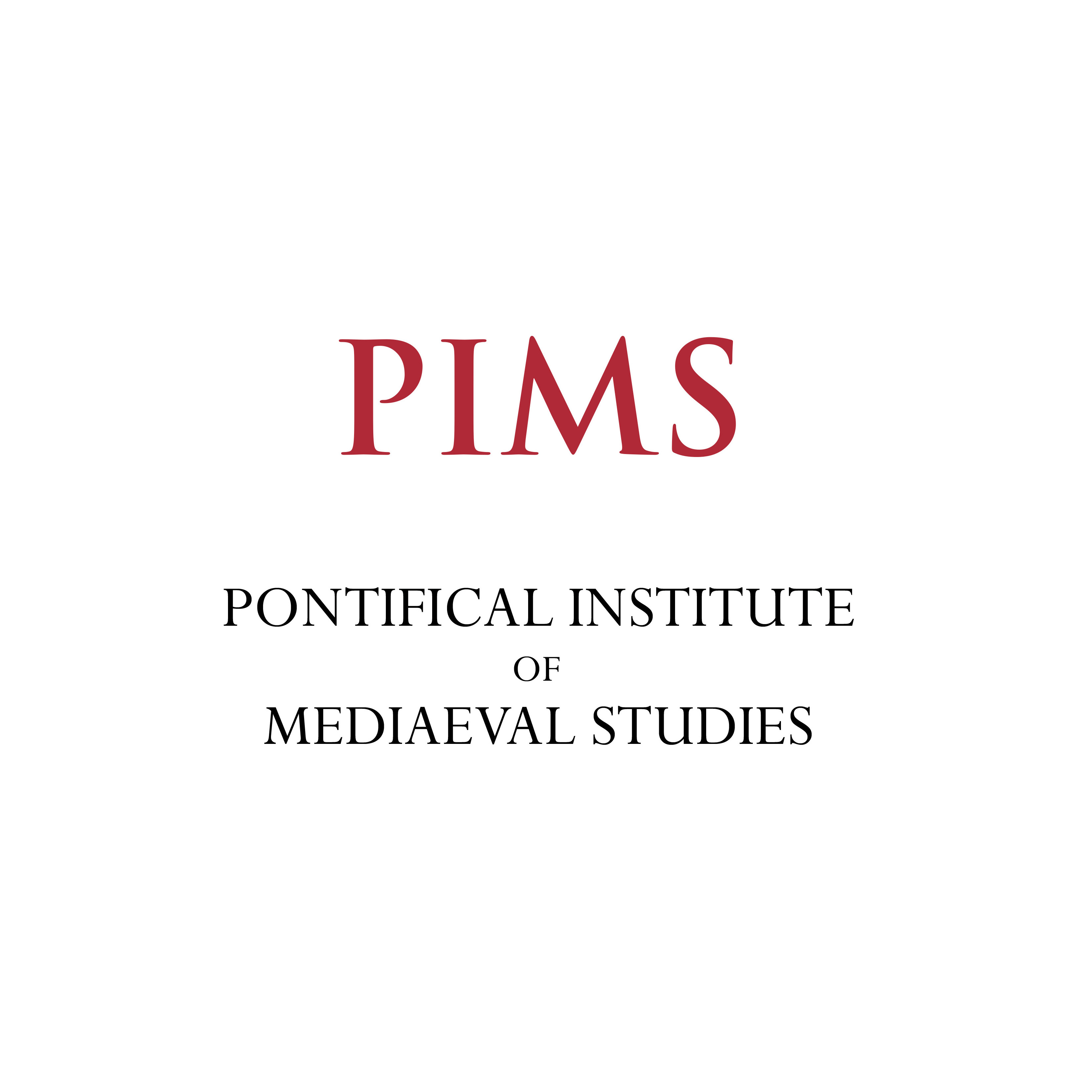CONTENTS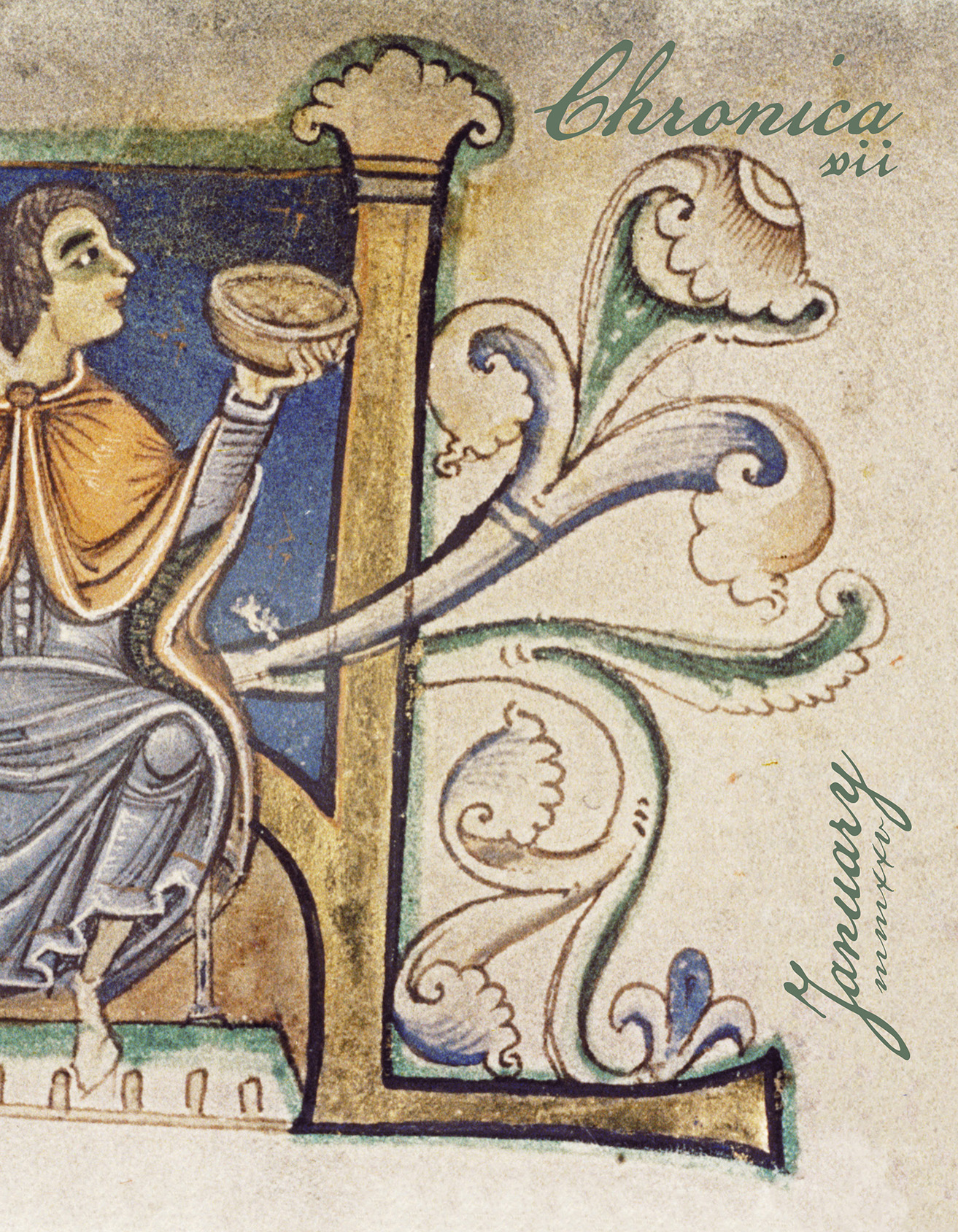
Message from the PhD Coordinator: Kara Gaston
Dictionary of Old English:
Co-Editors Stephen Pelle and Robert Getz
SSHRC Insight Grant / DOE Support
DOE Team: Cameron Laird, Deanne Brook's, Mark Gibbard, Thomas Kalil, Wynn Martin
Faculty Profile: Sebastian Sobecki
Craig Dobbin Fellow: Rebecca Stephenson
Reflections from the Bennett Visiting Scholar: Margot Fassler
Conferences & Lectures: Convivium / Co-Sponsored / photos
Publications
Congratulations
In Memoriam: Ronald John Zawilla
MESSAGE FROM THE PHD COORDINATOR
Geoffrey Chaucer’s Franklin’s Tale sets a winter scene:
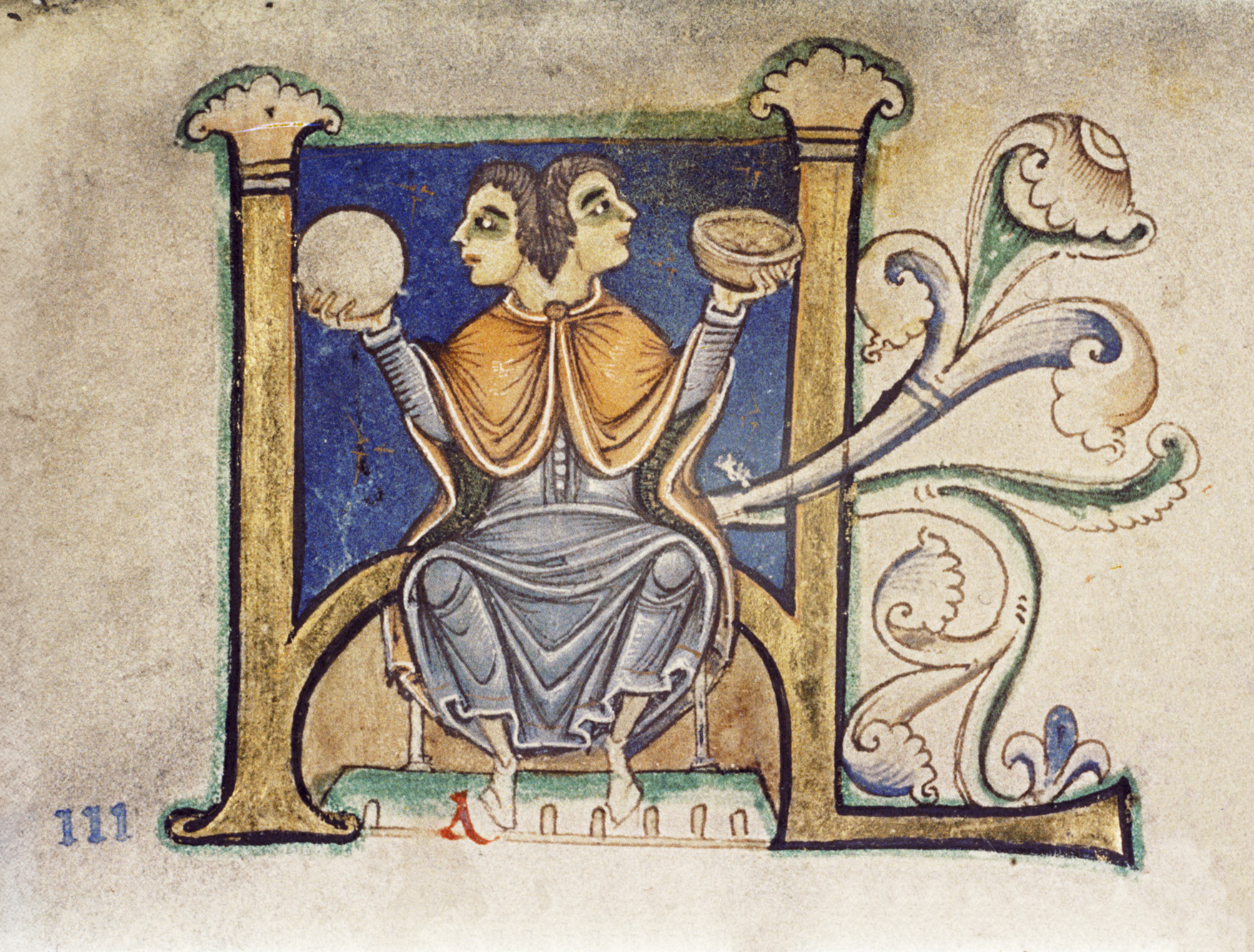
Bodleian Library MS Auct. D. 2. 6, fol. 002v
And this was, as thise bookes me remembre,
The colde, frosty seson of Decembre.
Phebus wax old, and hewed lyk latoun,
That in his hoote declynacion
Shoon as the burned gold with stremes brighte;
But now in Capricorn adoun he lighte,
Where as he shoon ful pale, I dar wel seyn.
The bittre frostes, with the sleet and reyn,
Destroyed hath the grene in every yerd.
Janus sit by the fyr, with double berd,
And drynketh of his bugle horn the wyn;
Biforn him stant brawen of the tusked swyn,
And “Nowel” crieth every lusty man. (1243 – 55)
And this was, as these books remind me, the cold, frosty season of December. Phoebus has grown old and colored like copper alloy—he who in his hot declination shone like burnished gold with bright rays—now he alights down in Capricorn, where he shines very palely, I dare well say. The bitter frosts, with sleet and rain, have destroyed the green in every yard. Janus sits by the fire with his double beard and drinks wine from his ox horn. Before him is the boar’s flesh. And every good man cries, “Noel!”
Chaucer evokes the season using astronomy, weather, and artistic convention. The sun is in the sign of the winter solstice. The rain and sleet have killed the green grass. Janus is feasting by the fire, an image based on the artistic tradition of the Labours of the Months. Like other Chaucerian time descriptions, this one culminates in a shared human response to the moment: the greeting “Noel.” Yet despite the appearance of synchrony, the moment itself emerges as slippery and multifaceted. Chaucer digresses mid-sentence to recall the sun’s appearance during the summer solstice.
Janus, the two-faced god, is traditionally associated with January, not December. Even the account of the weather evokes how things used to be (the grass used to be green). Chaucer’s poetry is Janus-faced, depicting its moment in terms of recollection and anticipation.
This passage invites reflection on time in many respects. I am struck by how effectively it conveys temporal experience to readers far removed in time and space, even as (or especially because) it shows how the moment is divided between past and future, memory and anticipation. The passage also particularly evokes times experienced as a break from regular activity, such as the pause between semesters. Like Janus, I hope you’ve spent at least some time this season relaxing with snacks.
There is quite a bit to look forward to in the upcoming semester. There is a schedule of Convivia, which began on January 10th with presentations from CMS PhD Candidates Jack McCart and Matthew Reid. Over February break, CMS students will travel to Cologne for the 10th Toronto-Cologne Graduate Student Colloquium, and April includes the Alumni lecture by Dr. Anna Wilson, the O’Donnell lecture by Dr. Stella Panayotova, and the Old English Colloquium. This term’s Chronica gives the full schedule of events as well as pieces on what’s happening at the Dictionary of Old English, a reflection on the fall semester by Dr. Margot Fassler, and a celebration of research at CMS with Professor Sebastian Sobecki.
Happy New Year and I hope to see many of you in the new term!
- Kara Gaston
CMS PhD Coordinator
DICTIONARY OF OLD ENGLISH
The Dictionary of Old English defines the vocabulary of the first six centuries of the English language, using twenty-first-century technology, developing and maintaining important scholarly resources for the study of Old English. Co-Editors and CMS Alumni Stephen Pelle and Robert Getz recall their time as Students, and how getting involved with the DOE shaped their studies, and continues to contribute to their research.
Stephen, what sparked your curiosity in Old English, and how did it bring you to CMS?
I took Latin in high school and have been interested in ancient languages ever since. I had the opportunity to take Old and Middle English courses as an undergraduate student at Cornell, but what convinced me to stick with Old English was a great course I took on the Vercelli Homilies with Samantha Zacher.
A couple of my professors at Cornell received their PhDs from CMS, and they always spoke highly of the program. My main research interest was in the relationship of Old English texts to their Latin sources, and with the Centre’s strong reputation in both Old English and Latin, it seemed an ideal place to continue my studies.

CMS was a very welcoming environment, and I have remained close friends with many of my fellow students. We did indeed have a softball team – the glorious Papal Bulls! – and I also fondly remember the department’s Latin Scrabble tournaments (usually won by Rob). During my time as a PhD student, I gained valuable research experience as a Research Assistant both at the Dictionary of Old English and with Fr. Édouard Jeauneau at PIMS. The Faculty were approachable and generous in providing guidance during my dissertation research.
How did you first connect with the DOE, and how did it influence your scholarly studies and research?
Soon after I defended my PhD, I was awarded a Postdoctoral Fellowship at the Pontifical Institute of Mediaeval Studies, which allowed me to remain in Toronto. During my fellowship, two drafting editor positions opened up at the DOE, and I was fortunate to be appointed to one of them.
I had used the DOE in my Old English courses as an undergraduate student, but I first got to know the project and its team through a course in Old English philology that I took with Toni Healey, then Chief Editor of the DOE, in my first year as a PhD student. The course met at the DOE, and I was impressed both by the resources that were gathered in the project’s offices and by the camaraderie of the editors and staff.
As a Research Assistant at the DOE during my doctoral studies at CMS, my main tasks were lemmatizing and proofreading. Once I became an editor, I was responsible for creating entries rather than simply checking them. This was an intimidating prospect at first, but I benefited from the guidance of two veteran drafting editors, Ian and David McDougall, whose last few months before retirement overlapped with the first few months in my new position. This teamwork is still what I like most about daily life at the DOE.
Many of the articles I have written began with problems I encountered while drafting DOE entries, so my work on the project is integral to my research. My daily work at the DOE has given me a much better understanding of Old and Middle English phonology and dialectology than I would have had otherwise.
How do you define the Dictionary’s progress and legacy?
There have been many changes during my time at the project, but one of the greatest is the evolution of digital resources, especially the digitization of manuscripts and journals, and the effect of this evolution on our daily workflow.
The DOE is a warm and friendly community of scholars. Experienced members of the team are generous and patient with new arrivals, and the collaboration of team members at different stages of their academic careers ensures both that traditional scholarly skills are taught to new generations, and that newer tools and methods are introduced to the project.

Rob, how did your interest in Old English develop, eventually landing you at CMS?
In my last year of university, I took a class on Old Church Slavonic. I enjoyed it so much that I decided to learn more ‘old’ languages. Old English seemed like a good place to start since I had had an interest in the words and grammar of my first language since I was a boy. I began studying it on my own and then took an introductory class back in my hometown at the University of Kansas. I discovered soon that I wanted to study the language more deeply and naturally gravitated to U of T, the centre of Old English in North America, where I completed an MA and a PhD.
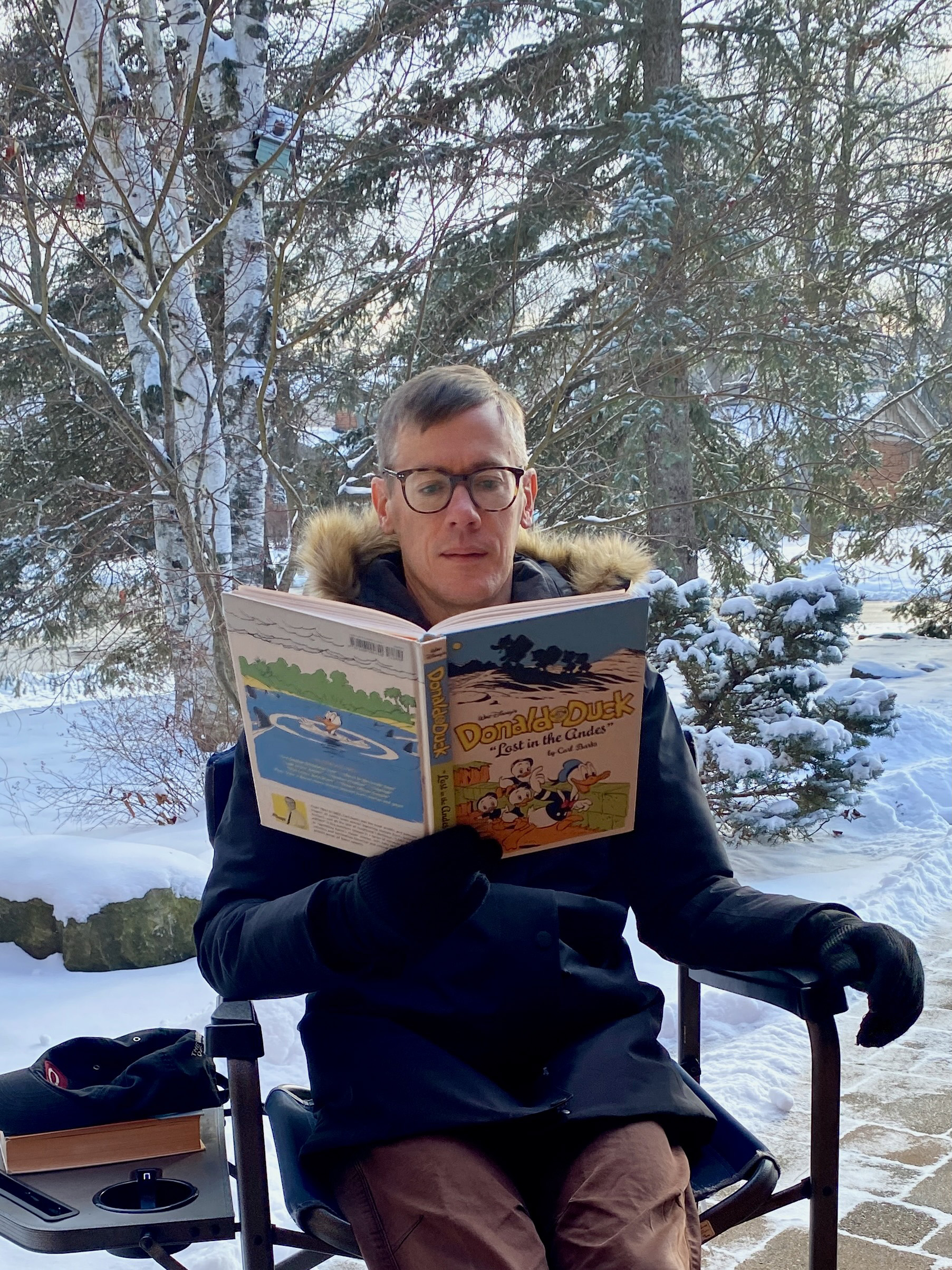
My time as a graduate student at CMS was very happy. I enjoyed reading poetry in Old English and Latin, learning the fundamentals of palaeography, studying Old Norse, and gaining a greater acquaintance with the medieval world generally. The classes at CMS were amazing; they had me reading Aldhelm or Bede, Beowulf or Cynewulf, or perhaps the Vercelli Homilies, Wulfstan, Walter Map, the Speculum stultorum, an Icelandic family saga, or Eddic poetry. I was fortunate to have outstanding professors, especially those from whom I learned the most, like Antonette diPaolo Healey and A.G. Rigg.
CMS offered many opportunities for learning outside of the classroom and for socializing. My favourite activities were Latin Scrabble, playing on the CMS softball team (the Papal Bulls!) in the summers, and participating in informal reading groups with fellow students like Stephen Pelle and Paul Langeslag. We ploughed through a good deal of Old English verse but also texts in Old Frisian, Old Saxon, and Old and Middle Dutch.
How did you first connect with the Dictionary of Old English project, and what continues to make it exciting work?
In my first year as a graduate student, I took a course taught by George Rigg on the techniques used by Old English translators to turn Latin texts into their own language. That was when I first met Toni Healey, who sat in on all the classes—I was impressed that the Cameron Professor of Old English was so eager to learn! She asked me later that year if I’d like to work at the Dictionary of Old English as a Research Assistant. Of course, I enthusiastically said yes, and the next year I began proofreading entries at the Dictionary’s offices on the fourteenth floor of Robarts. I was checking manuscript variants, trying to make sense of Northumbrian gospel glosses and charter bounds (texts I’d never encountered before, which at first seemed unintelligible), and comparing psalter gloss versions. Tasks like these revealed the variety of Old English, and made me much better acquainted with the entirety of the corpus.
I worked as an RA at the Dictionary for the rest of my time as a graduate student and always found it rewarding. For one thing, there was the chance that you might find something that had been overlooked or might correct a small mistake in an entry. For another, you got to read thousands of citation slips drawn from every part of the corpus, one after another. While this is obviously no replacement for reading single texts through carefully, it’s a wonderful way to discover new things. You don’t know what you may find in the next slip: a contemporary record of a dispute about land ownership, a famous crux from Beowulf, an enigmatic entry from a 7th-century Latin-Old English glossary, a description of an ealdorman feigning sickness to avoid going into battle, or a medical recipe with curious ingredients. This aspect of the Dictionary’s work is something I still enjoy very much today when I’m drafting or revising entries.
Another thing I especially like about writing entries is that you often learn something new that isn’t linguistic per se, since you’re obliged to provide definitions for words that were used to describe every part of the natural world and human activity. I’ve found myself learning about linden trees, the Eurasian skylark, the crafts of weaving and spinning, ship-building, and phlebotomy, simply to understand the meaning of the word I’m dealing with. But even when that isn’t the case, the work always holds plenty of interest for me in the puzzles that it constantly presents, whether that is assigning a particular written form to its proper headword, interpreting the syntax of a sentence, making sense of an unusual Latin lemma for an Old English gloss, or recovering part of a text transmitted in corrupt form.
How have you seen the DOE evolve over time?
While the essence of the Dictionary’s work remains the same as it was almost a quarter of a century ago (the limit of my acquaintance!), some things have changed notably, most obviously in terms of technology. I remember learning to use a microfiche reader soon after I arrived in Toronto in order to consult the Dictionary’s fascicles for A through E. Since then, the Dictionary moved first to CD-ROM and then to online publication. Now it’s easy to access and easy to search—a huge improvement. The Dictionary’s web Corpus also has much-improved search capabilities, which have recently become available to all our users at long last. They’ve facilitated our lexicographical work greatly and should now make it much easier for everyone to use the Corpus.
DOE NEWS
- The DOE celebrates Catherine Monahan as she retires after more than thirty years as Managing Editor.
- CMS and the DOE extend a special thank you to interim Administrative Assistant, Elsie Nisonen who has been supporting the administrative efforts of the Dictionary.
- In December 2024, the DOE launched its new Electronic Corpus. This version of the Corpus features improved search functions, reflects all corrections made since the release of the 2009 version, and incorporates newer editions of many Old English works, especially charters.
- CMS and the DOE extend heartfelt thanks to the late Jennifer Rigg (d. 2022) for her extraordinarily generous donation to the Dictionary. We also thank Grace Desa and the Advancement team for their dedication to honour Jennifer’s legacy.
- The Dictionary is thrilled to welcome new team member, Administrative Assistant, Xi Wang.
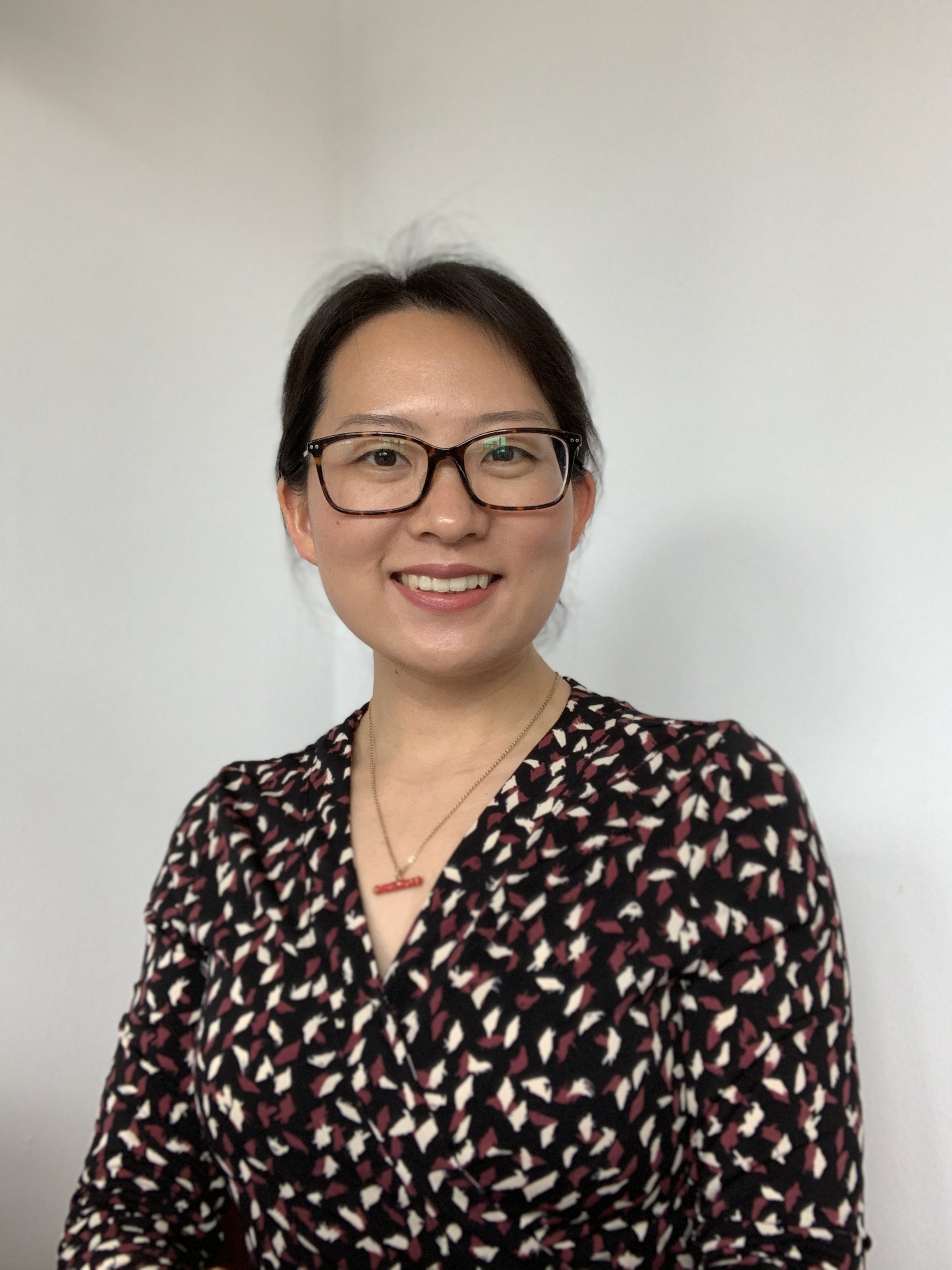
With extensive experience in administration, I look forward to supporting the DOE research team to ensure efficient and seamless operations, contributing to its continued success.
- Xi Wang
Administrative Assistant, DOE
Stephen Pelle and Robert Getz have recently been awarded a SSHRC Insight Grant for the Dictionary of Old English to facilitate completion and publications of words beginning with the letter L, from Li to Ly, bringing the Dictionary to its alphabetical midpoint.
What does this funding mean for the DOE?
The new SSHRC grant has allowed us to offer a two-year postdoctoral fellowship to recent CMS graduate Dr. Deanna Brook’s. In addition to helping the editors draft entries for the Li–Ly fascicle, the grant gives Deanna an opportunity to continue her own research at one of the most important centres for Old English studies in the world.
Why are grant funding and donations important for the DOE, and why is the DOE important to its supporters? How can the medievalist community support the Dictionary?
Grants and donations are our main source of income; without them, our project wouldn’t exist. The Dictionary is important to our donors for a variety of reasons; many of them use the fruits of our research in the Dictionary’s published entries and our web Corpus in their everyday work. Some donors simply love language, literature, and history, and want to aid the advancement of knowledge in these areas. Even more are proud of an ambitious Toronto-based project that is intended to make a major and lasting contribution to our understanding of the English language.
What do you hope the medievalist community will gain from the DOE?
It’s wonderful to see people taking an interest in Old English and becoming acquainted with it, whether that means learning about some particular words or points of grammar, or exploring the language thoroughly. Enthusiasm for Old English is strong at U of T, where (in keeping with long tradition) we have so many fine scholars, teachers, and students who love the language and the literature, and they communicate that love to others.
We hope that the Dictionary will continue to stimulate interest in Old English, both at home and abroad, by making essential resources for the study of Old English available to the scholarly community and the wider public. The Dictionary also allows graduate students and postdoctoral fellows the opportunity to familiarize themselves deeply with the extant corpus, and develop their own research.
How do you envision the project’s legacy?
The main legacy of the project, of course, will be the Dictionary itself in complete form. It will take some time for that goal to be reached, but it is safe to say that the finished work, a labour of decades, won’t be easily superseded. Perhaps it will be revised in the future, like the Oxford English Dictionary, but it will still represent the fruition of Angus Cameron’s vision of a new Old English dictionary based on a comprehensive examination of the evidence.
In addition to research grants, the Dictionary of Old English’s pursuit of funding is ongoing. The DOE welcomes financial support from scholars and advocates worldwide.
Medievalists interested in supporting the work of the Dictionary can visit the project’s website or contact the staff to learn about donation opportunities.
Are you interested in creating transformative opportunities for CMS students at the Dictionary of Old English? Contact Niamh Earls Hallworth, Associate Director, Advancement at niamh.earls@utoronto.ca or 416-978-4177.
THE DOE TEAM
Cameron Laird is a CMS Alumnus and now Research Associate at the Dictionary of Old English. Deanna Brook’s is a recent graduate of the CMS PhD Program and now Postdoctoral Fellow at the DOE. Both also former Research Assistants at the Dictionary, these Alumni illustrate their progression through the DOE, beginning with their love of languages and literature.
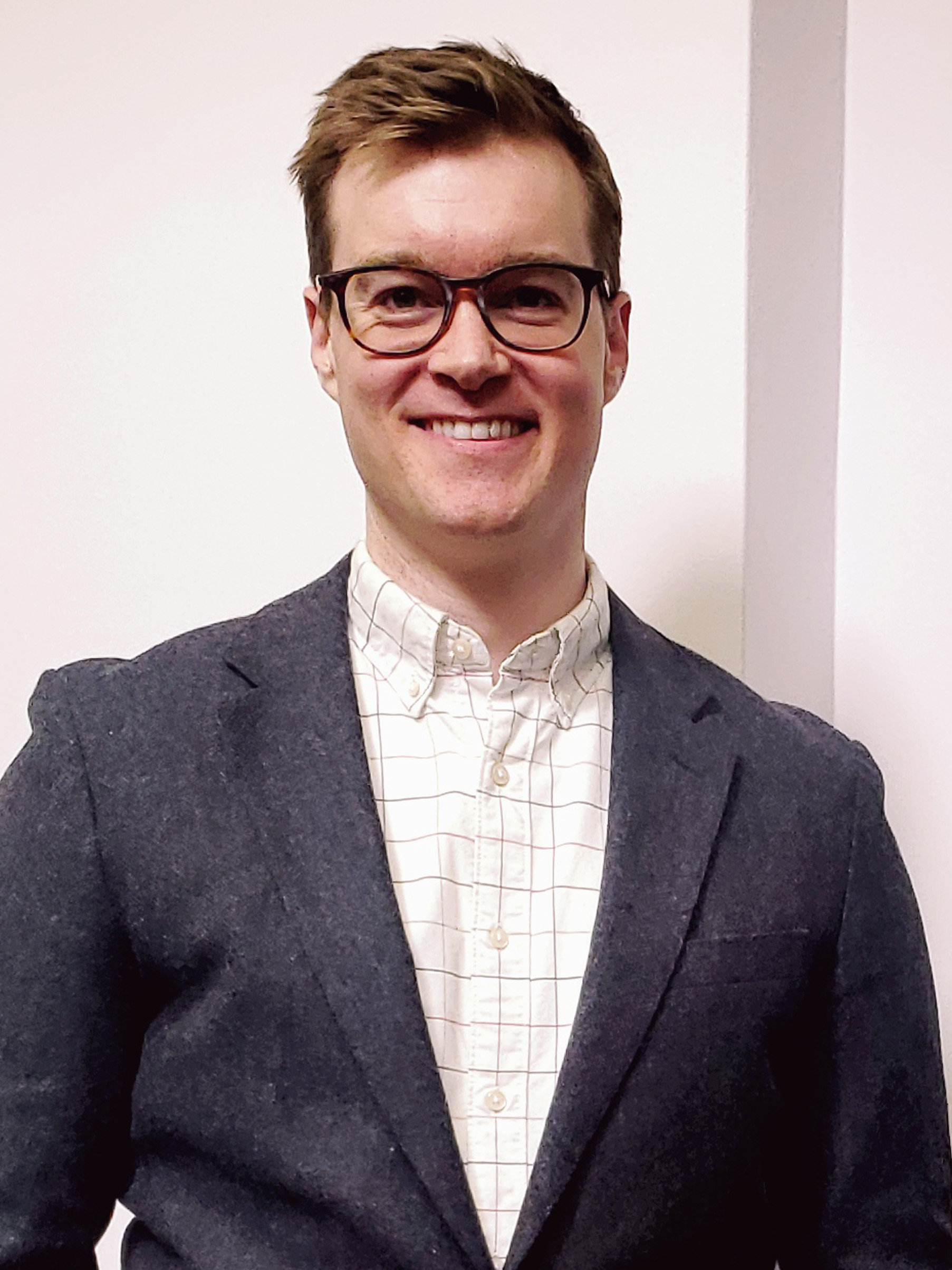
"My undergraduate degree was a broad liberal arts program that emphasized the study of primary texts in their historical contexts. When I encountered Beowulf and other Old English poems in literature courses, I found that they naturally lent themselves to this same approach. As an interdisciplinary program, CMS was ideal to pursue my interest in Old English literature in its historical and cultural contexts.
I credit the Centre for instilling in me a lifelong love of languages, especially dead ones. I also benefitted from belonging to the diverse, intergenerational community of scholars at CMS and PIMS. I am especially grateful for the opportunity to collaborate with Professor Emeritus Michael Herren and others on the Épinal-Erfurt Glossary Project at U of T. My role as Associate Editor on the project was effectively a multi-year paid apprenticeship with one of the most learned scholars of the Early Middle Ages, and the work we have done together will keep me busy for many years to come.
The DOE is the premier research project in Old English studies and an indispensable tool for every scholar in the field. One advantage of pursuing Old English in Toronto is the opportunity for graduate students to contribute to this prestigious project. Whereas academic research is so often a solitary pursuit, the DOE is inherently collaborative, with every entry passing through many editors and proofreaders, including graduate students.
I have been fortunate to hold various positions in this process, as a Research Assistant, as a Postdoctoral Fellow, and now as Research Associate / Copy Editor. During this time, I have performed nearly every task at the Dictionary, including writing entries. In my current role as Copy Editor, my past experience with the project will help me to maintain the DOE’s high editorial standards for accuracy and consistency.
The DOE’s future at Toronto is bright. Its original plan was so well conceived by founding editor Angus Cameron and his colleagues—Roberta Frank, Ashley Crandell Amos, Antonette diPaolo Healey, and others—that our primary task now is simply to see it through to completion. Once every word has been defined and the dictionary itself has been completed, I see the DOE continuing as a world-class research library for Old English studies. One of my goals is to catalogue and digitize the DOE’s holdings, so that students and scholars from around the world can see online the substantial resources available here."
- Cameron Laird
Research Associate, DOE
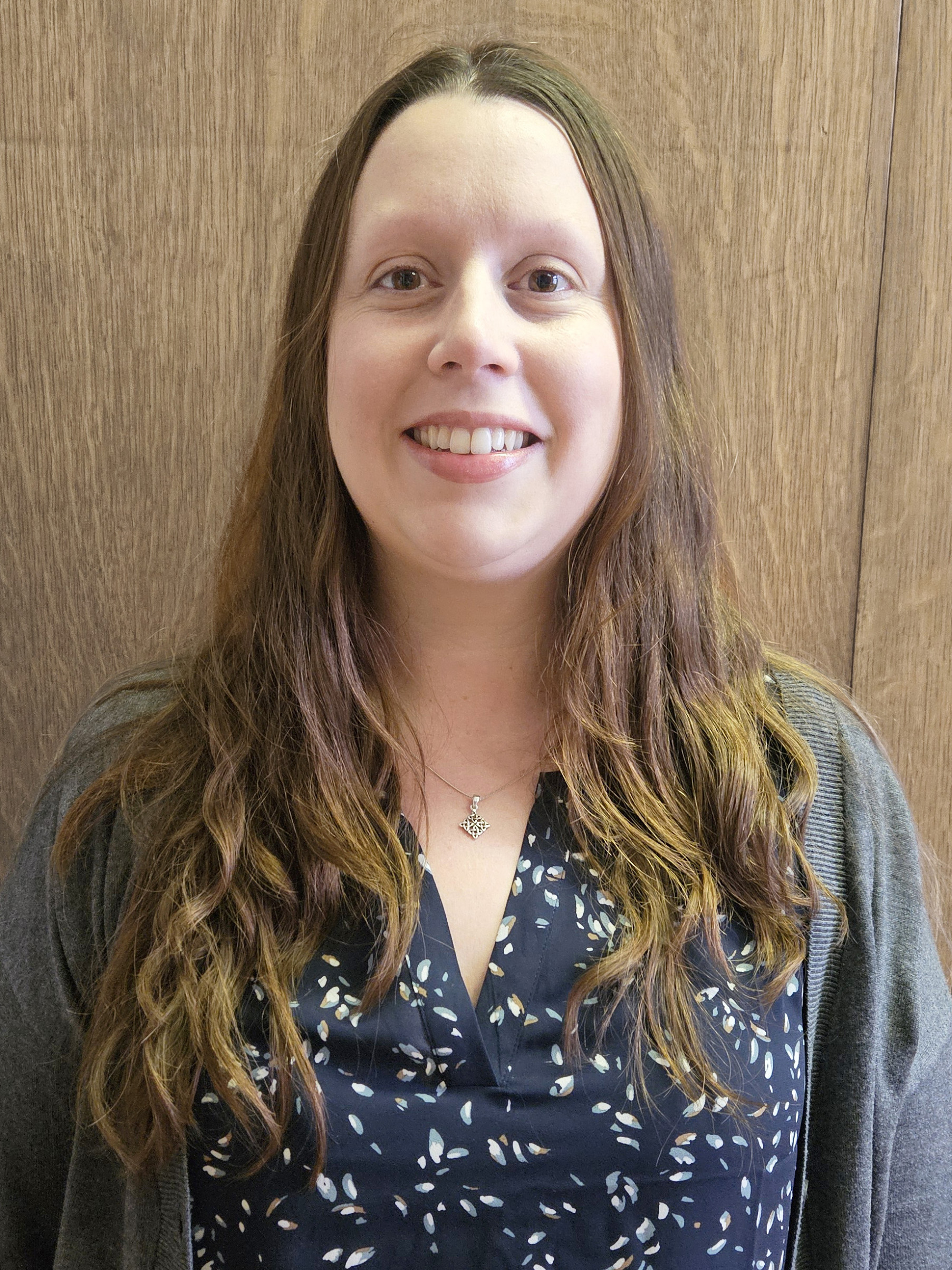
"When I first entered the CMS MA program, I was initially looking to improve my Latin and study a broader range of medieval-focused topics and literature. CMS seemed the perfect environment, with its range of courses and disciplines, and, in the first year of my PhD,
I took Introduction to Old English. Not only did I truly enjoy this class, which allowed me to combine my love of languages, manuscripts, literature, and history, but it defined the direction of my future dissertation. I was fortunate to be in a program which allowed me to combine my various interests into a study of how Old English-Latin translation functioned in the early 11th-century, and its interaction with booklets and manuscripts.
I first joined the Dictionary of Old English as a Research Assistant during my PhD, which held the benefit of introducing me to so much of the Old English literary corpus. At the same time, I learned the careful and detailed editing that is required of each entry. Part of what drew me to a postdoctoral fellowship with the Dictionary was the ability to expand upon these skills and to contribute even further to this invaluable project. As a Fellow, I am beginning to learn the complex process of entry-writing and, as part of that, am helping the editors with current entries. I also get to work on my own projects that consider Old English translation, booklets, and Old English conceptions of the mind, body, and soul.
For many scholars of Old English, myself included, the Dictionary of Old English and its associated Corpus are invaluable tools, provinding the ability to carefully study words, phrases, and search for shared portions of text. The new Corpus in particular, with its increased searchability, has allowed my own research to be more detailed. I look forward to the new directions I will be able to consider with this tool, and to contributing to the Dictionary of Old English itself during my fellowship."
- Deanna Brook’s
Postdoctoral Fellow, DOE
RESEARCH AT CMS
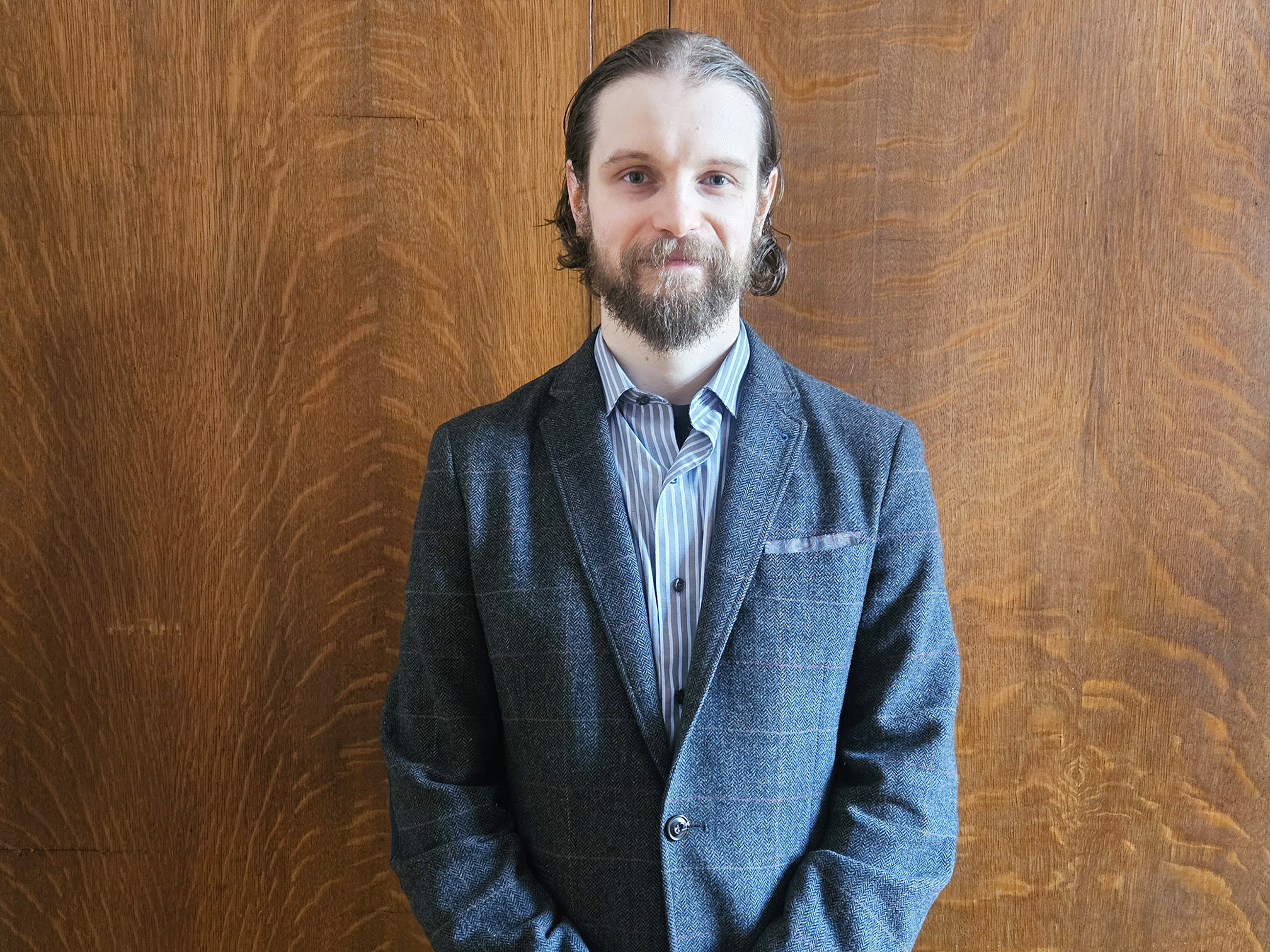
"The Centre hosts several major research projects, including collaborative ventures, associated journals, and publication and lecture series. Among these projects is the Dictionary of Old English, which was conceived in 1968 and launched in 1976. The DOE
continues to offer a regular venue for research training. Students have the opportunity to contribute to these projects as Research Assistants while learning valuable skills outside of the classroom.
Being trained as a Celticist, I was pleasantly surprised when I received a research assistantship at the Dictionary of Old English. I first became involved in medieval studies when I took Old Irish, somewhat on a whim, as an undergraduate student. I fell in love with medieval languages, and knowing that there were unedited texts in manuscripts that continued to decay inspired me to pursue a career in the field. It seemed to me that the famed difficulty of Old Irish grammar was the secret code that could unlock these texts, and that the secrets held inside were worth saving.
My interest in other languages led me along the way to pick up Middle Welsh, Old English, Old Norse, Medieval Occitan, and naturally, Latin, to name a few. The ability to learn such an array of vernaculars I feel is an often-overlooked value of CMS.
Working at the DOE is definitely invaluable for keeping up paleographical skills but also for familiarising oneself with the full range of the Old English corpus. (I’ve had to consult leech-books twice as often as Beowulf!) Contributing to a medieval dictionary is incredibly rewarding and I can only hope to one day work on a similar Celtic project."
- Mark Gibbard
CMS PhD Candidate /
DOE Research Assistant
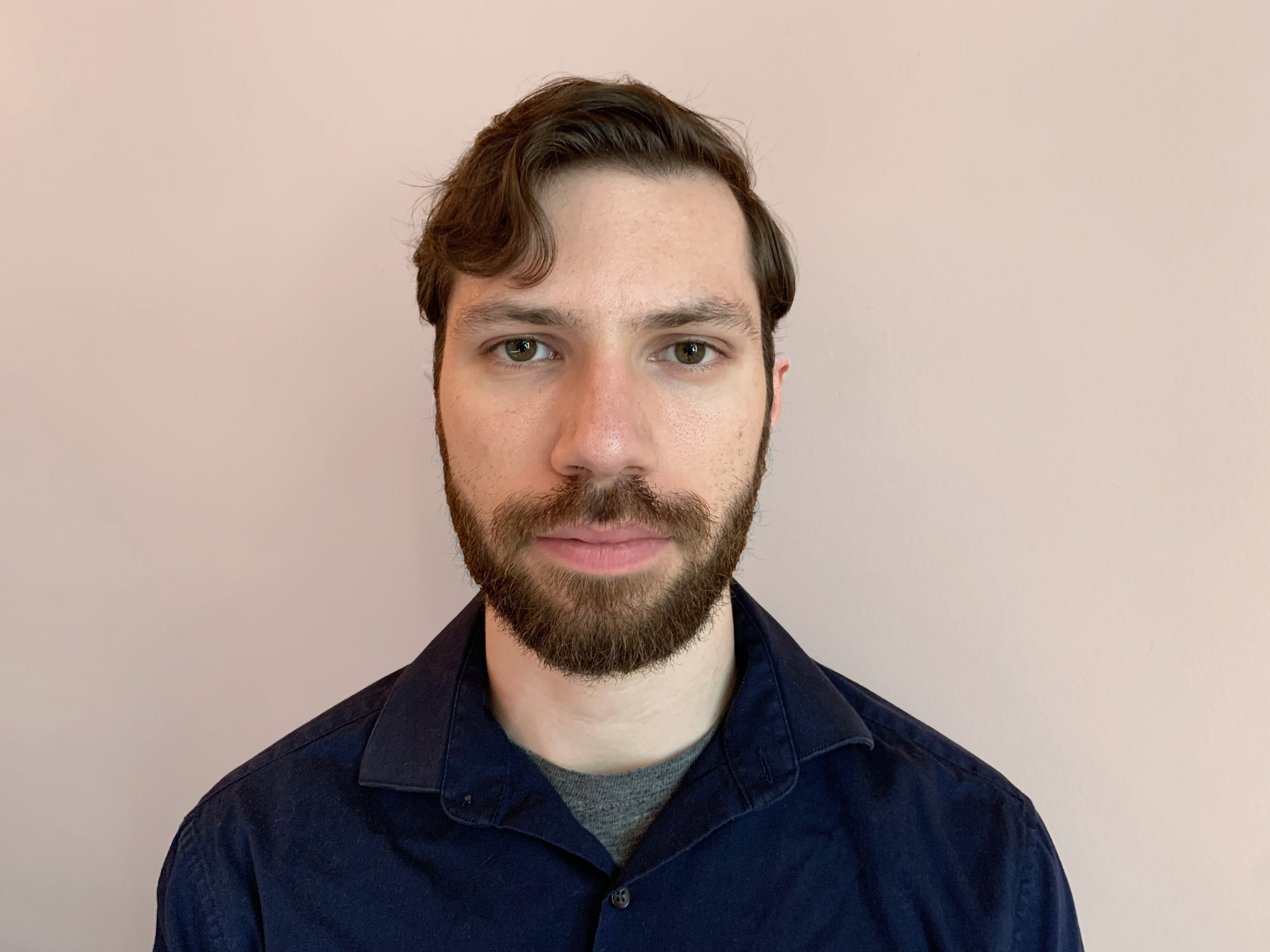
Although a lifelong language-lover and fan of authors like Tolkien and Lewis, I grew up in a STEM family and quite confidently pursued engineering in undergrad. When (four years and a degree later) that didn’t feel right, I switched to Pre-Med. Luckily, there was an
introductory Latin course being offered at the time, which I took. The English department also offered several medieval-ish courses, allowing me to read Beowulf for the first three times. Everything clicked. And, it just so happens that my Latin instructor recommended CMS. I did my Master’s here a couple of years ago, and am now back for the PhD.
Being interested in the medieval North Atlantic and so far focusing on Old English, my RA-ship at the DOE is simply fantastic. Even after only one semester, I already have a much better knowledge and awareness of the sheer multitude of texts in the corpus—especially those outside of the poetic canon (not that Beowulf hasn’t popped up). There are so many homilies, glosses, and medical texts that I can now at least recognise. Also, being amongst all the print editions and manuscript facsimiles feels a bit like being a monk in a scriptorium. One with fluorescent candles.
- Thomas Kalil
CMS PhD Student /
DOE Research Assistant
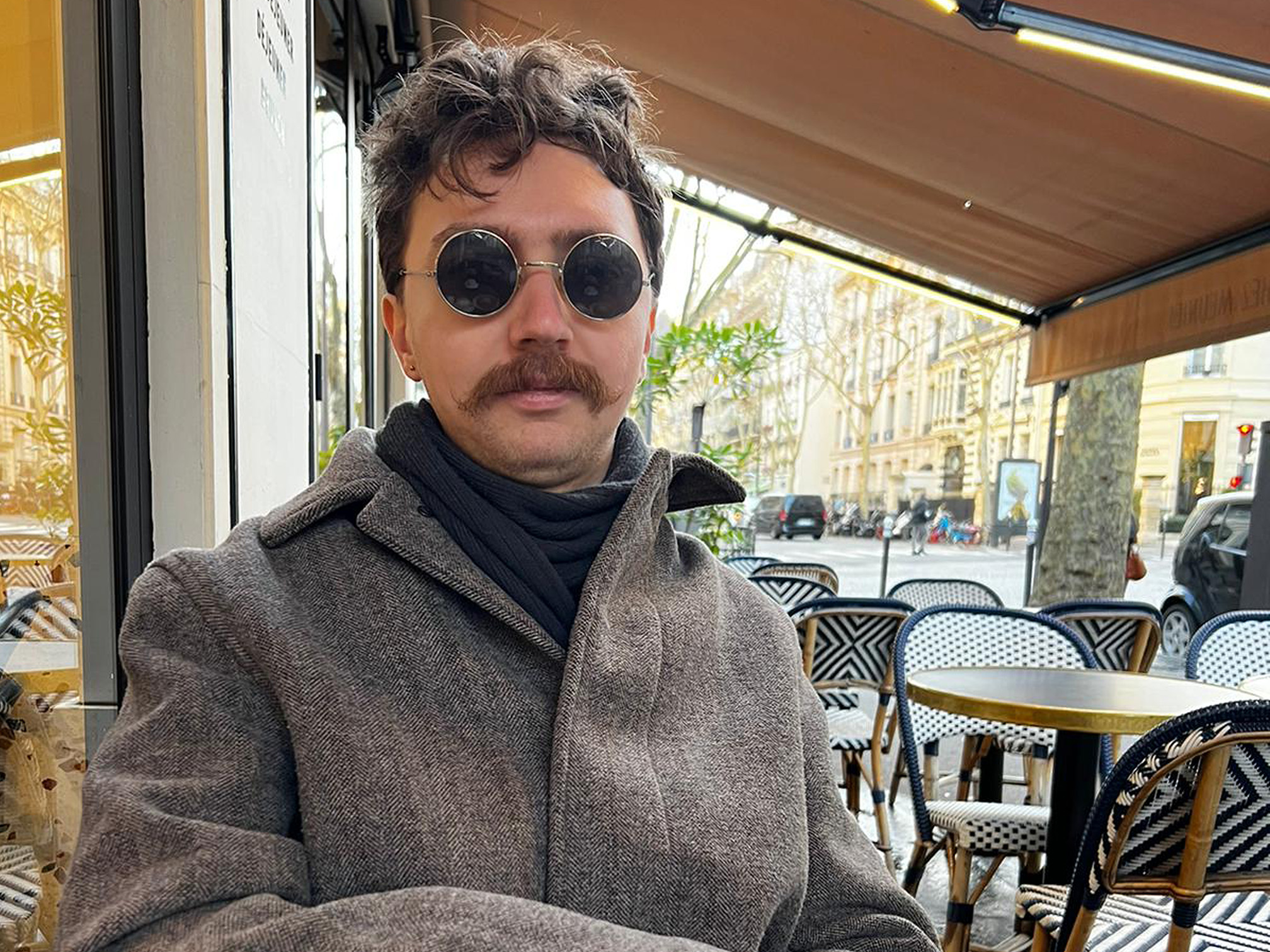
Tabletop gaming and fantasy fiction were my gateway into medieval studies. In high school, I inhaled the works of Tolkien and read Poetic Edda, which inspired me to become a philologist. I completed my BA in medieval studies and Latin at St. Olaf College, and, after
a love affair with linguistics and Proto-Indo-European studies, I decided to pursue an MA in medieval studies here at the Centre.
Due to, in no small part, my early loves of all things Tolkien, Insular, and Northern, my research focuses on worldbuilding in Middle English and Old Norse-Icelandic romance. I am also interested in early Middle English language and literature, and I have found that my three years as an RA at the Dictionary of Old English have made me a better medievalist.
One of the Centre’s great strengths is its training in Latin and paleography, but especially in its breadth of languages. The DOE presented me with hands-on experiences in said expertise. Without my work as a Research Assistant, I would not be as familiar with how critical editions work, with the landscape of Old English codicology and paleography, or the breadth and depth of Old English glosses, homilies, and laws. I am honored to be part of the lovely DOE community and its storied lexicographical endeavor.
- Wynn A. Walk Martin
CMS PhD Student /
DOE Research Assistant
FACULTY PROFILE
Sebastian Sobecki, Professor in the Department of English and Centre for Medieval Studies has been a force since he arrived at the University of Toronto for the 2022-2023 term. Professor Sobecki kicked off the inaugural CMS Convivium with a talk on his revolutionary discovery of archival documents regarding Thomas Hoccleve (1368-1426) and has continued to be an enthusiastic supporter of the Centre’s Students, Faculty, and Staff. A winner of this year’s U of T Dean’s Research Excellence Award, Professor Sobecki has been making headlines with his many accomplishments, publications, fellowships, and awards. Here, he relays his scholarly journey and celebrates the resources at his medieval home, and the research community at U of T.
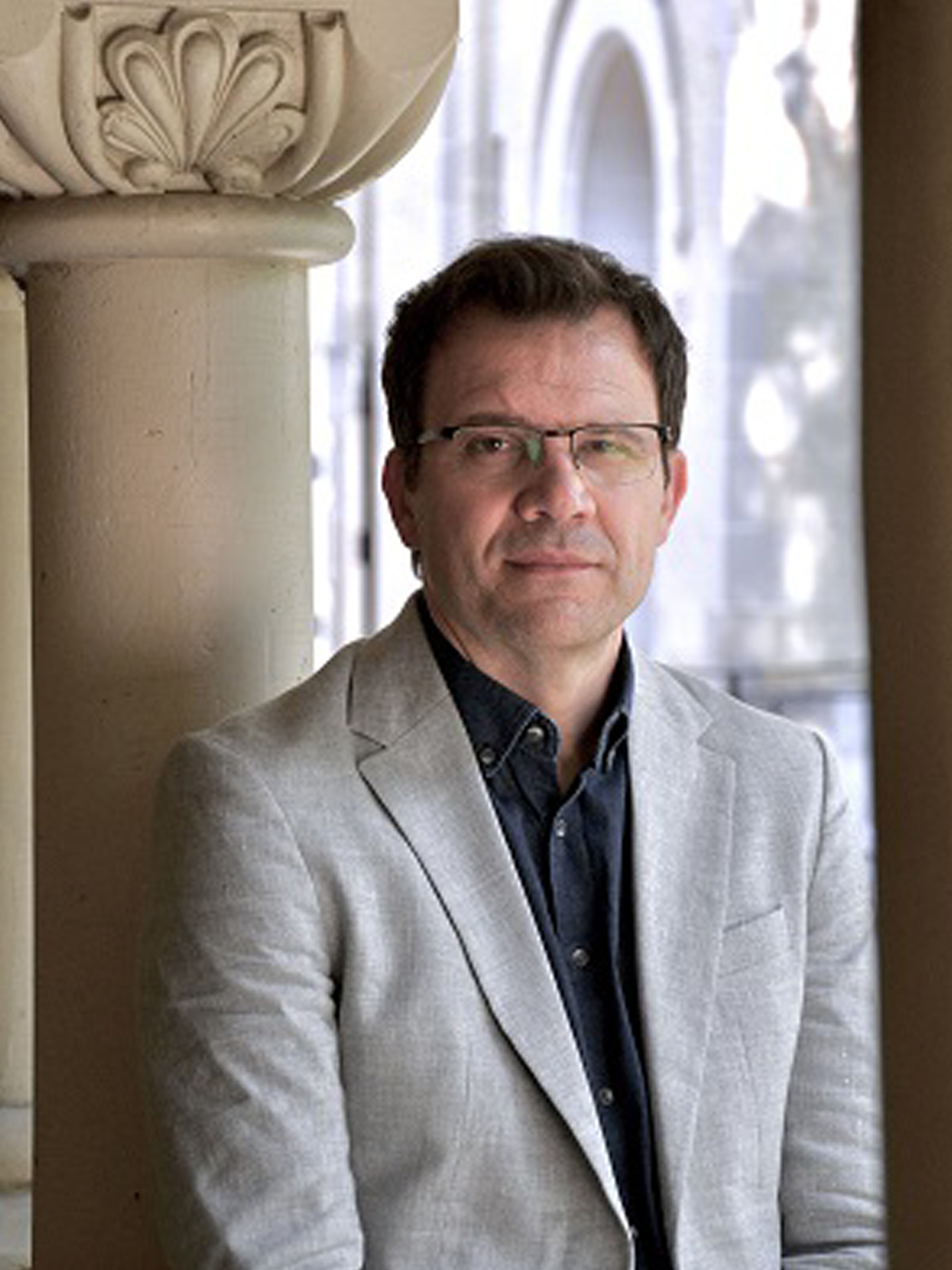
How did your interest in book history and medieval literature develop, eventually leading you down an academic path and arriving at U of T?
The Middle Ages were my first love. As a child in 1970s Poland, I watched a film adaptation of Henryk Sienkiewicz’s The Knights of the Cross, about the conflict between the Teutonic Order and the Polish-Lithuanian Commonwealth, and I was sold. A year or so later, after we had fled to Germany, I was given a colouring book version of Sir Walter Scott’s Ivanhoe, which pretty much cemented my obsession with all things medieval. So, between Scott and Sienkiewicz, it turned out to be 19th-century Romanticism that converted me to the Middle Ages. I wanted to be a medievalist for as long as I can remember!
Cambridge’s English Department, where I took three degrees between 1996 and 2005, was a fabulous place for budding medievalists. Jill Mann and Richard Axton were my guides through Chaucer, James Simpson opened my eyes to the arc of history, Charles Moseley introduced me to Mandeville and travel writing, and Chris Page made an interdisciplinary scholar out of me, while Richard Beadle showed me how the study of handwriting and manuscripts can be a form of close reading. I have had truly wonderful teachers all my life, and their lessons continue to direct much of my own teaching and research.
The Centre for Medieval Studies, with its device – the Orb and Four – was one of the constants, a beacon throughout my student days. My most important reason for coming here, though, was the knowledge that I would be working with truly brilliant graduate students. When the opportunity emerged to join U of T as a medievalist, with a twin home in the English Department and CMS, I had to go for it. Knowing that colleagues of mine such as Alexandra Gillespie, Will Robins, and Fabienne Michelet – whose work I have long admired – were based here made U of T irresistible.
How has your research benefitted from the resources and collaborative opportunities at U of T?
The medievalist ecosystem at U of T is probably the world’s finest. Between the English Department, CMS, PIMS, and the treasures of the Fisher Library, I can’t think of a more welcoming and inspiring medievalist concentration of talent and kindness. The opportunities for collaboration here are endless. I’m particularly excited by Alexandra Gillespie’s Old Books New Science lab, which I joined shortly after arriving at U of T; being able to work with cutting-edge technology alongside colleagues and graduate students to find answers to questions that have occupied me for decades is a revelation.
I’m also a firm believer in tightly integrating teaching with research. All of my graduate teaching and most of my undergraduate classes are closely tied to my research. This is where I can make the biggest difference and help my students profit the most from my own work. Medieval Studies is scientia, in the sense of ‘knowledge’, but it’s also a contemporary science, and, as such, moves quickly. I want my students to participate in the latest debates and developments, shifts and breakthroughs. This is what makes our field so exciting: the Middle Ages are many centuries old yet shaped by what we don’t yet know.
PROFESSOR SOBECKI MAKES THE NEWS
- received this year’s Arts & Science Dean’s Research Excellence Award in recognition of his significant and sustained research excellence, achievement and impact
- elected to the Fellowship of the Royal Historical Society
- named a Fellow of the Prestigious English Association for his exceptional contribution to English Studies
- led the Thomas Fisher Rare Book Library in acquiring rare mid-1300s manuscript, Sir John Mandeville’s Travels
CRAIG DOBBIN SCHOLAR
Rebecca Stephenson, Associate Professor at University College Dublin has been awarded a Craig Dobbin Legacy Scholarship to conduct research in Canada, and has chosen CMS as the setting. This Spring, Dr. Stephenson will make use of U of T’s libraries and resources, and in turn treat the community to a lecture on Vikings, the Apocalypse, and Byrhtferth’s Scientific Writing.
What can you tell us about your current research?
My first book project examined the relative status of Latin and English in early medieval England, and the idea that Byrhtferth of Ramsey and Ælfric of Eynsham present an identity for English-language translation that does not accord with how we know these texts to
have been used. They felt compelled to apologize for their English-language works, suggesting that they were forced to write in English due to the ignorance of the laity and untrained clerics. Yet, we have evidence that Ælfric’s patrons had a very good understanding of Latin and that Byrhtferth’s monks preferred his English translations to his Latin texts. It is surprising that Ælfric and Byhtferth invest such effort into an identity for English as a low-status language with minimal utility, when the texts were frequently copied and used; when a text is useful, it takes on a different kind of status.

My interests in scientific writing and computus stemmed from a similar desire to rewrite a narrative more in line with how the extant sources were used. Computus is ostensibly used for calculating the date of Easter, but in 10th-century England, this date is not in dispute. Though the texts say that monks need to be able to calculate the date of Easter, that is not logistically true or practical. The date could be set by the archbishop’s staff, and a letter circulated, a more efficient way to ensure correct observance. Furthermore, many computistical diagrams are “broken;” copied without key instructions, missing columns, or exhibiting other obvious defects. In researching, I came to see that there were political and existential concerns tied up in scientific writing, specifically, anxiety about the millennium and the coming apocalypse, which drive the presence of computistical material in manuscripts in the late 10th century.
Why spend your fellowship at CMS?
I don’t need to tell you that the Centre for Medieval Studies at Toronto is one of the best in the world for Old English and Anglo-Latin study. I don’t need to tell you that the Centre for Medieval Studies is one of the best in the world for Old English and Anglo-Latin study. With the Dictionary of Old English, PIMS, and the Centre’s top-flight medieval Latin scholarship, I’ve wanted to have time to study in Toronto since my graduate education at Notre Dame. The fact that my long-time collaborator, Renée Trilling, accepted the position of Angus Cameron Professor of Old English further motivated me to make the trip.
The Craig Dobbin Legacy Scholarship is different from other fellowships in that it is specifically about building networks between Ireland and Canada. So, while I will be drawing on resources at PIMS and the Dictionary for my own research, it is important to connect with people and begin conversations about potential collaborations and research directions.
You will present your research at the March 28 Convivium; can you give us a preview of your talk?
Byrthferth’s Enchiridion is a bilingual schoolbook on computus, and the few people who study this text tend to read it for the interactions between Latin and English or for its wild diagrams. It’s seen as a book for those interested in cosmology or computus, but not engaged with current politics. Since computistical books contain formulae about dating, we can trace its creation to the year 1012, the worst year of Viking attacks, the attacks of Thorkell the Tall.
Although Byrhtferth never mentions the Vikings in this scientific piece, I believe they lie behind every page and behind the apocalyptic trajectory of the text. How would it change our reading of Byrhtferth’s Enchiridion, if we read it as a work responding to viking attacks through the medium of apocalypse?
What else do you hope for your visit in Toronto?
I have a confession to make, although my research is heavily philological, I’m a hand spinner with an interest in textiles. Yearly, in my undergraduate teaching, I present workshops on spinning / weaving / dyeing with either the Wife of Bath or the Miller’s Tale (which text depends on the date of Easter, believe it or not!) I’d be happy to do a similar seminar at CMS, or someone could just point me to the best knitting shops.
"CMS is a natural fit for Rebecca’s current project on apocalypticism in early medieval England. The libraries are a big draw of course, but so is the intellectual life of CMS. With a PhD in Medieval Studies, Rebecca knows first-hand how a vibrant interdisciplinary community like ours can enrich her scholarship. And, as a scholar trained in North America and working in Europe, Rebecca sees the field of medieval studies from multiple angles. I am delighted to bring that transatlantic perspective to CMS and to strengthen international networks for our students and faculty."
- Renée Trilling
Angus Cameron
Professor of Old English
REFLECTIONS FROM THE BENNET VISING SCHOLAR
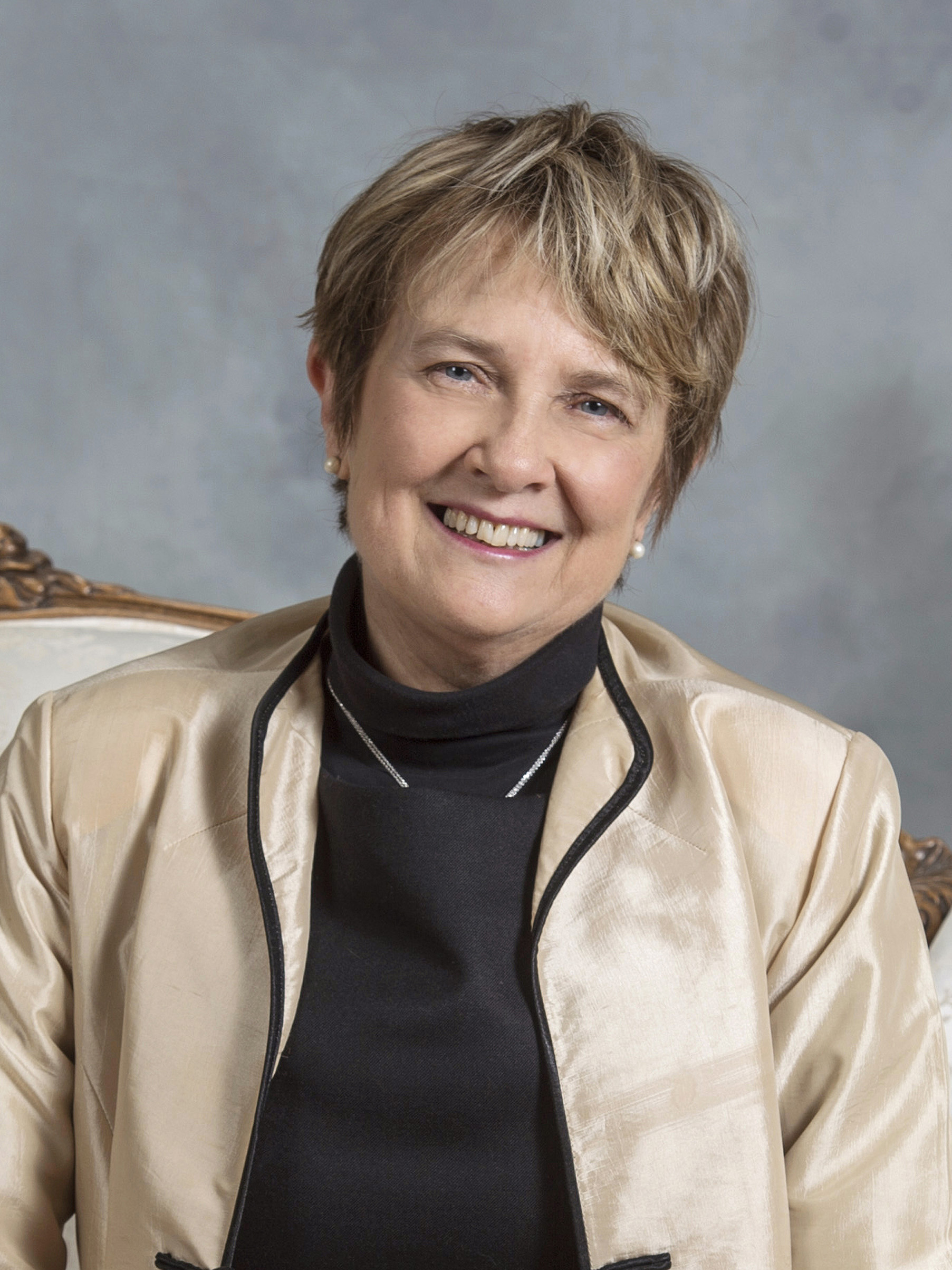
I showed up at the PIMS library (on the fourth floor of the Kelly Library at the University of St. Michael’s College) in mid-August, 2024, somewhat unaware of the spectacular array of books and materials that were about to greet me. Incredibly, too, I had been assigned
an office in the palaeography room, steps from those miles of manuscript catalogues that constituted a beloved haunt. Around the corner, my husband, Peter Jeffery, was ensconced as a visiting scholar. With Peter and the Director of the library, Greti Dinkova-Bruun, and Reference Manager Tristan Major, along with former librarian Fr. James Farge, there was always much to discover and to discuss. I had a great deal of work to do, proofs to correct, essays to finish, and, in December, a lecture to present to the medieval community. I could not have imagined a better place to work and I was only beginning to plumb the riches. Any medievalist seeking a good place to take a sabbatical should put PIMS at the top of the list.
In the weeks to follow I joined in a great number of lectures and workshops both at PIMS and at the Centre for Medieval Studies. Just across the street from the Kelly is PIMS itself. In its building, Augustine Thompson, OP, the praeses of PIMS, has his office and presides most eloquently over the many events that take place in the beautiful Shook Room, aided in his work by the PIMS Secretary Semira Abdulla. One of the most interesting of these gatherings was a symposium led by Professor Michèle Mulchahey, Director of PIMS’s Diploma Programme in Manuscript Studies, featuring students who studied in Rome and in Toronto. In the PIMS building too, one finds the offices of the PIMS press, ably directed by Fred Unwalla. I have experienced first hand the high level of excellence found in PIMS publications through an essay to be published in the forthcoming volume, Ritual Life in the Medieval Dominican Order: Liturgical Expressions, edited by Michèle Mulchahey and Augustine Thompson. Scholars with manuscripts that need a publication home: look to PIMS.
I was thrilled to have the chance to meet with so many graduate students from the Centre for Medieval Studies, and with the Mellon Post-Doctoral Fellows at PIMS. This extraordinary group of resident young medievalists makes U of T hum with activity. And then the colleagues! What a wonderful group of medievalists, led by the Director of the Centre, Elisa Brilli, who is a sparkplug for so much of the ongoing work of medieval students and faculty. Professors Jesse Billet and Riccardo Macchioro are wonderful colleagues for those of us who work on medieval Latin, and the Fellows of PIMS are always present to add to the mix as well.
My final work was to give the Bennett Lecture, and I chose for my topic music, liturgy, and art with the Clarissen nuns of Villingen in the Black Forest. I had been able to find excellent conversation partners for this work: Professor Bert Roest, who is a leading authority on religious reform and the Poor Clares, and then too colleagues in the regular meetings of The Other Sister, a scholarly symposium led by Professors Isabelle Cochlin and Alison More. They also edit a publication series at Brepols, The Other Sister: Active Women Religious in the Premodern World. The study of women religious is indeed alive and well at U of T, as are so many other scholarly endeavours for medievalists. I am deeply grateful for my time at PIMS and the Centre for Medieval Studies.
- Margot Fassler
2024 Bennett Distinguished Scholar /
University of Notre Dame
THE W. JOHN BENNETT DISTINGUISHED VISITING SCHOLARSHIP
Endowed through the generosity of W. John Bennett of Montreal in 2010, and an equivalent anonymous donation made to the Centre for Medieval Studies, the Bennett Distinguished Scholar allows senior international scholars a six-month visitorship to PIMS and CMS. The Scholar presents a public lecture, attends seminars, mentors graduate students, and plays an active role in the academic life of PIMS and CMS while pursuing their research.
CONFERENCES & LECTURES
Convivium / Co-Sponsored
- January 24 - Landon Reitz (Faculty of Arts & Science Postdoctoral Fellow), ‘Wer hât mich guoter ûf getân?’ Imagining the Reader in German Medieval Literature
REGISTER NOW - January 24 Convivium
- January 31-February 1 - PIMS Medieval Women Workshop VII: Sisters, Leaders, Writers and Readers
INFO - Medieval Women Workshop
- February 3 - Workshop: Old English stæfcræft and second-language acquisition methods: teaching Old English in a communicative, global context with Donna Beth Ellard, Associate Professor, University of Denver
Trisha Teig, Adjunct Professor, University of Denver
REGISTER NOW - Old English stæfcræft
- February 7 - Chris Nighman (CMS / Wilfrid Laurier), Digital addenda/corrigenda for printed critical editions of Latin texts: Auxiliary resources for the Electronic ‘Manipulus florum’ Project
REGISTER NOW - February 7 Convivium
- February 14 - John Philoponus: Texts, Contexts, Reception, organized by Tommaso De Robertis and John Magee
REGISTER NOW - Philoponus Colloquium
- March 6 - Friends of the PIMS Library Spring Lecture: Linda Safran
- March 7 - Jane Tylus (Yale University), CRRS / CMS Joint Lecture, Women as Witnesses: Grieving Mary in Medieval and Early Modern Europe
REGISTER NOW - March 7 Convivium
- March 21 - Rebecca Stephenson (University College, Dublin), The End of the World or merely another Viking raid? Vikings, the Apocalypse, and Byrhtferth’s Scientific Writing around the year 1000
- March 25 - Gilson Lecture: Mary Carruthers, The medieval lineage of 'alta fantasia'
- March 28 - Sarah Bowden (King's College London), Voicing Sin: The Textuality of the Confessional Voice in Twelfth-Century Germany
- April 4 - Annual Alumni Lecture, Anna Wilson (Harvard), title TBA
- April 11 - Annual O'Donnell Lecture hosted by Greti Dinkova-Bruun: Stella Panayotova (University of Cambridge) Latin Texts as Image Generators, Tenth-Sixteenth Century
- April 17 - Old English Colloquium, Janet Ericksen (University of Minnesota-Morris), title TBA
- April 25-26 - Annual Toronto Workshop in Ancient Philosophy: Aristotle’s 'Parva Naturalia'
Spring 2025 will also see the Department of Classics, with CMS, welcoming guest lecturers presenting research talks related to the Professor of Late Antique Literature and Thought. Sign up for alerts, subscribe to the weekly digest, or submit a posting by contacting medieval.communications@utoronto.ca, and visit medieval.utoronto.ca for the most up-to-date information on events, news, and employment positions.
PAST CONVIVIA
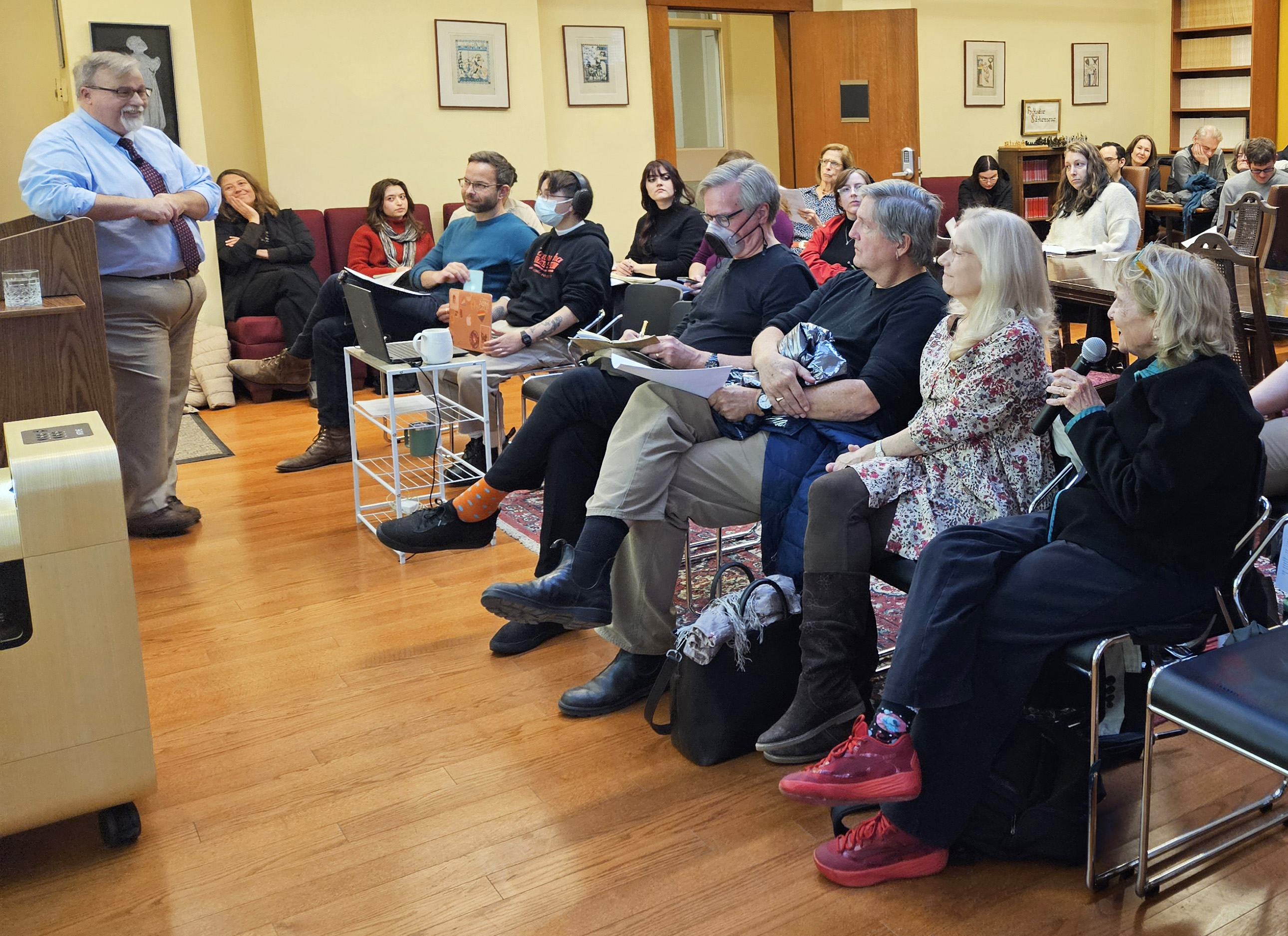
Unbelief in the Proslogion.
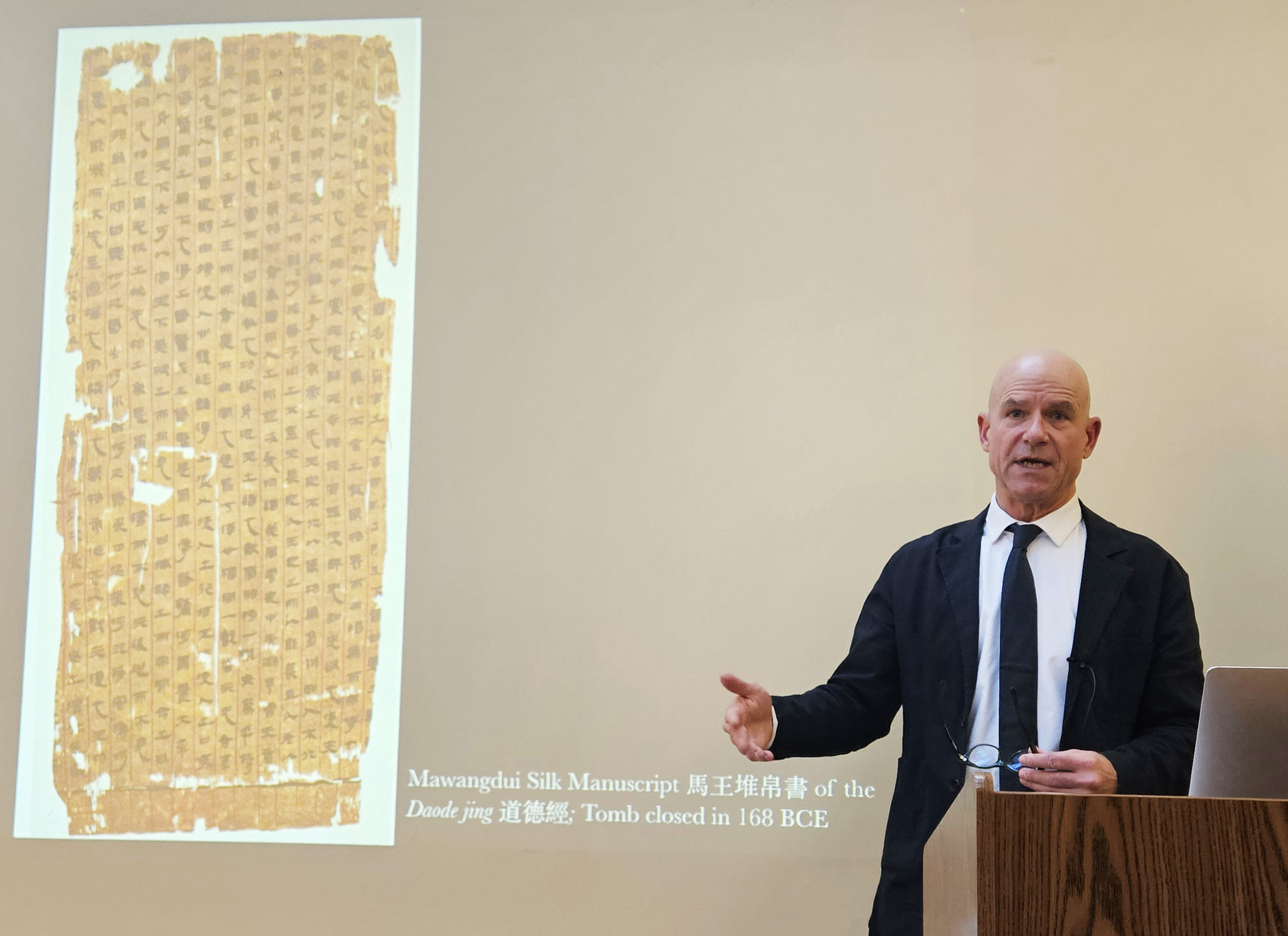
Here, Professor Robson discusses the Mawangdui Silk Manuscript of the Daode jing.
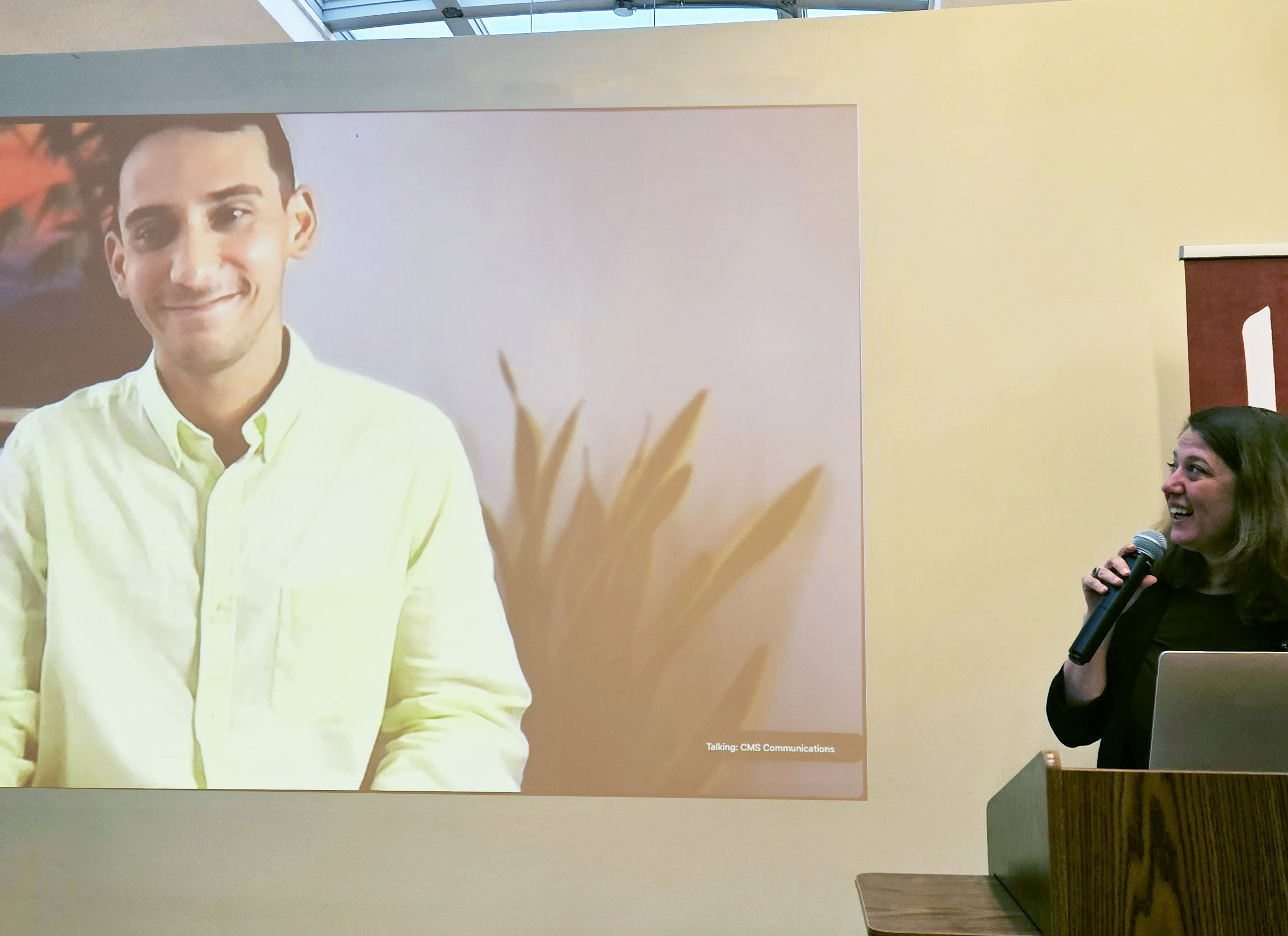
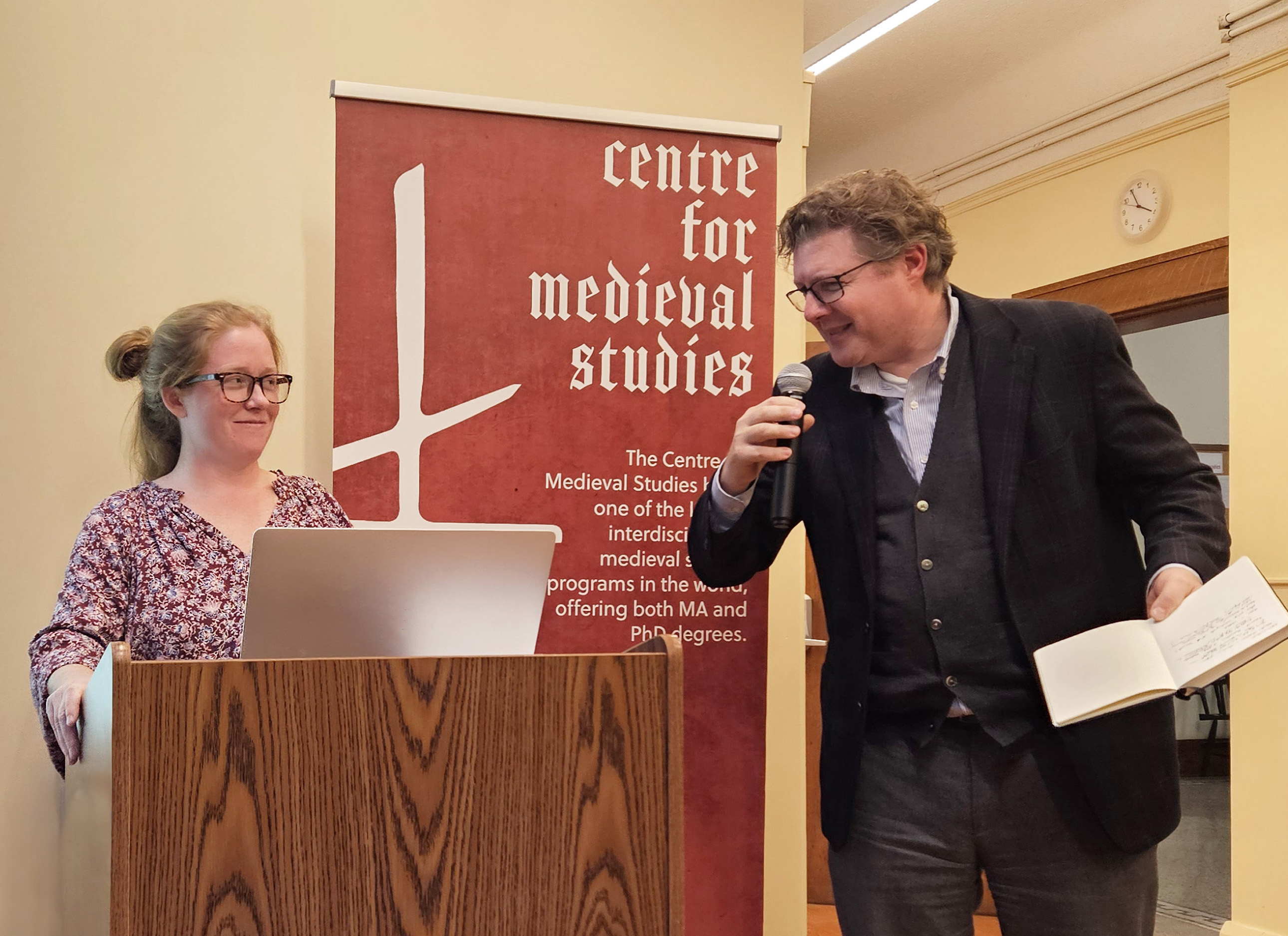
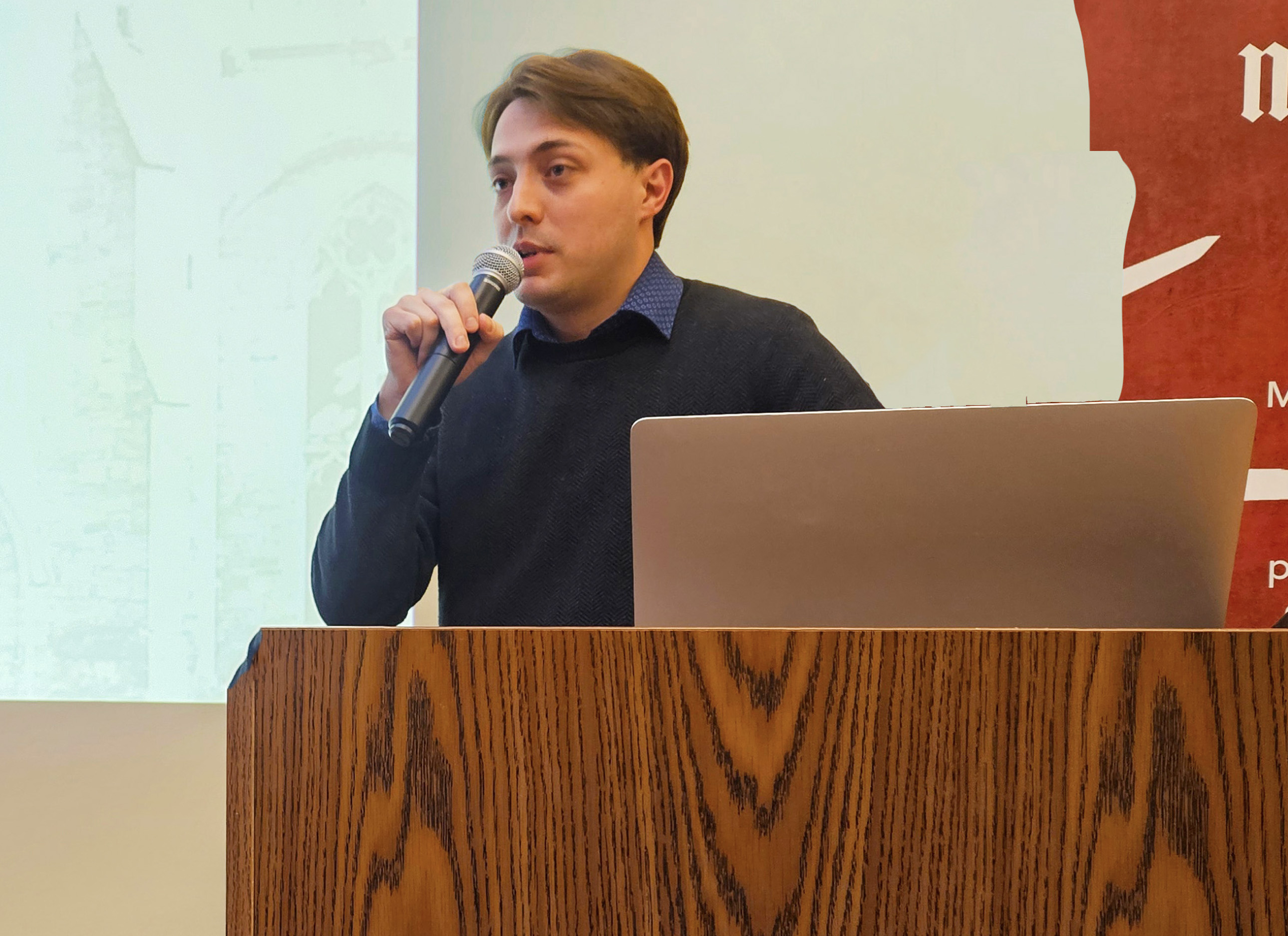
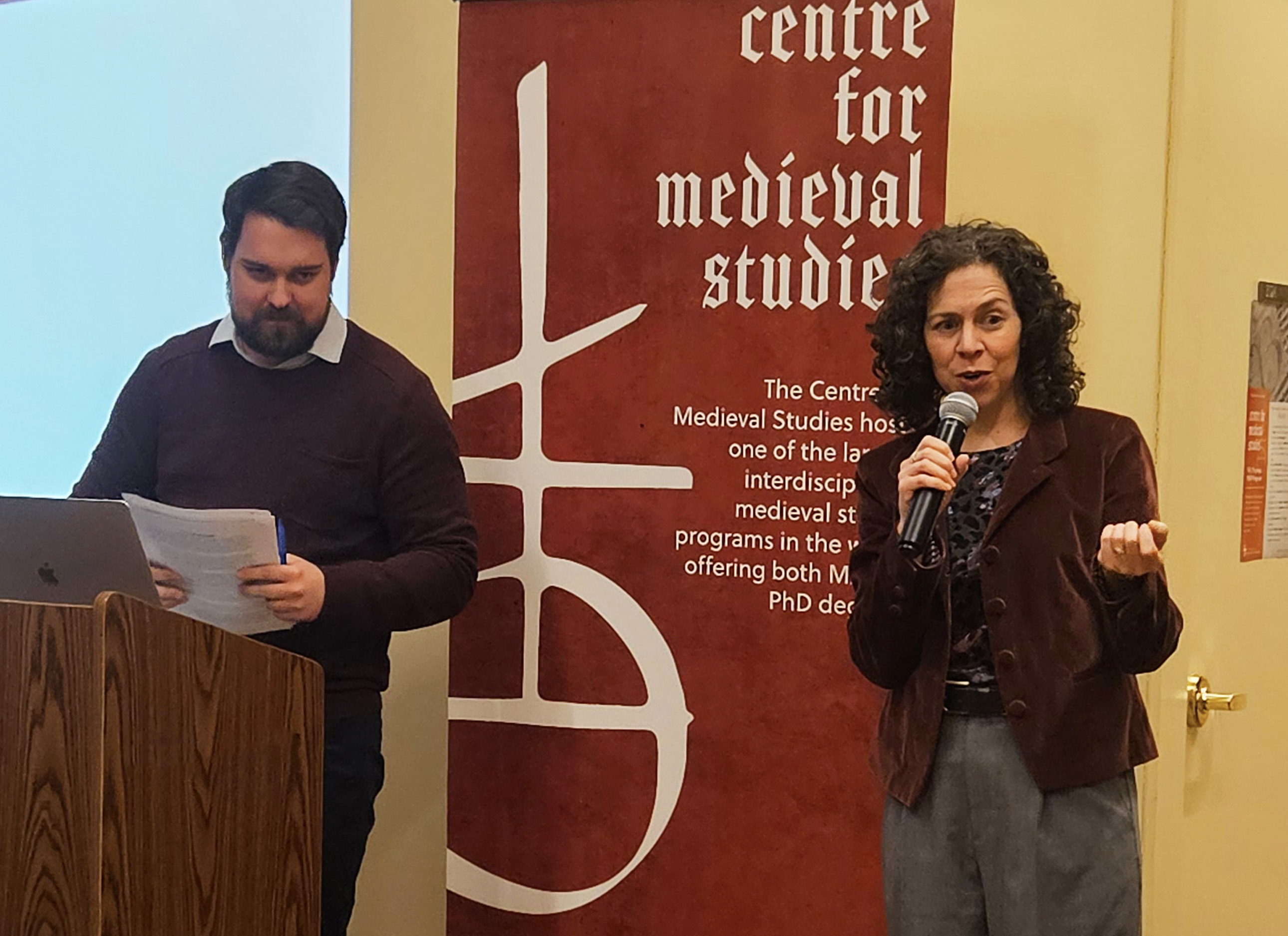
PUBLICATIONS
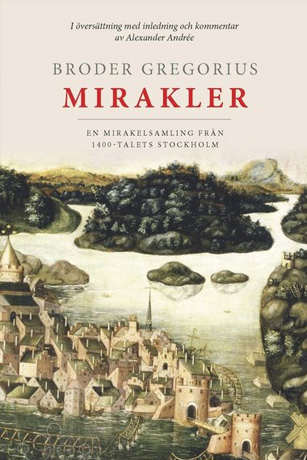
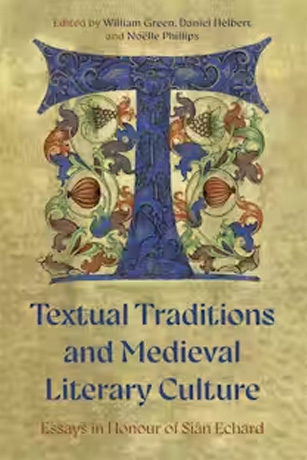
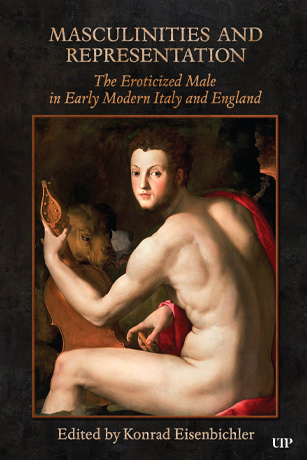
The Eroticized Male in Early Modern Italy and England • Konrad Eisenbichler • University of Toronto Press
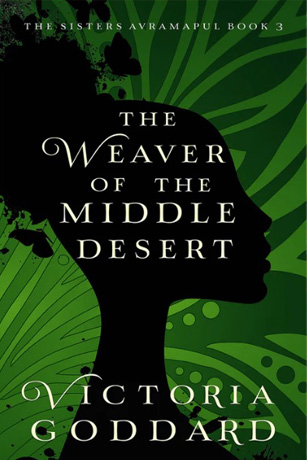
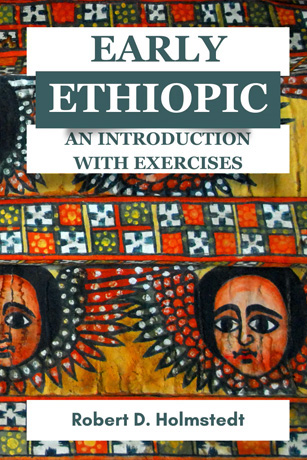
Robert D. Holmstedt •
GlossaHouse
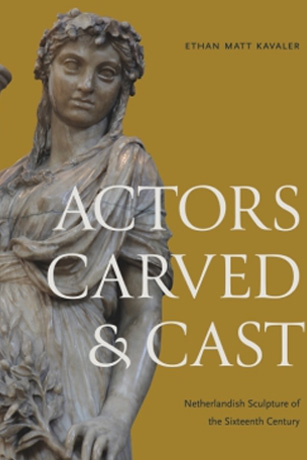
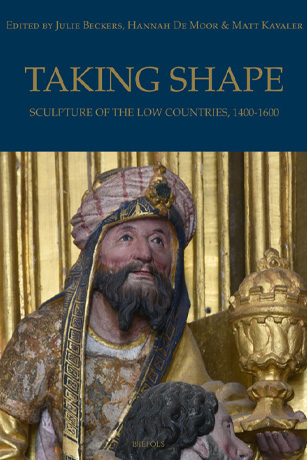
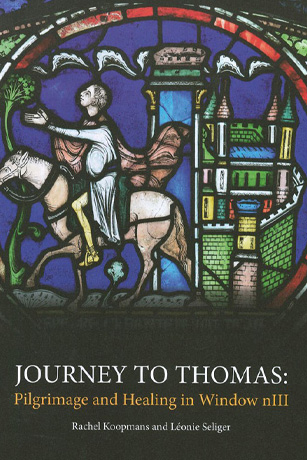
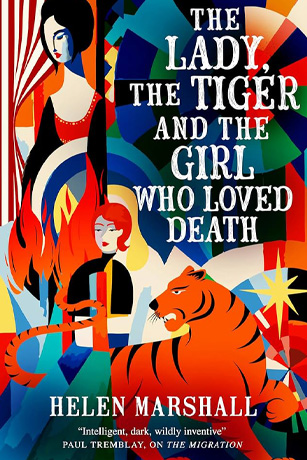
Helen Marshall • Titan Books
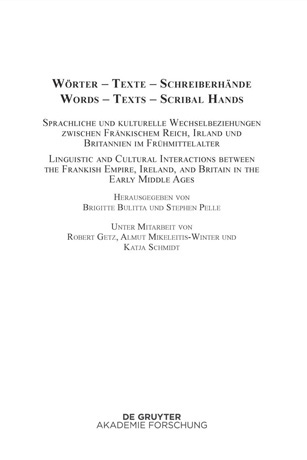
Sprachliche und kulturelle Wechselbeziehungen zwischen fränkischem Reich, Irland und Britannien im Frühmittelalter Linguistic and Cultural Interactions Between the Frankish Empire, Ireland, and Britain in the Early Middle Ages • Edited by Brigitte Bulitta and Stephen Pelle in collaboration with Robert Getz , Almut Mikeleitis-Winter and Katja Schmidt • with chapters by Antonette diPaolo Healey, Michael W. Herren, and Haruko Momma • De GruyterAkademie Forschung
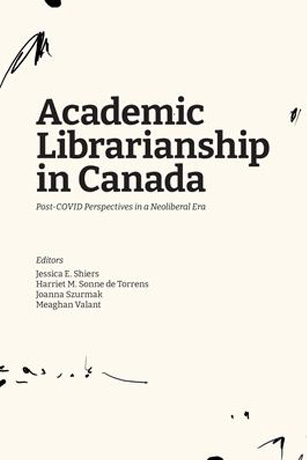
Neoliberal Era • Edited by Jessica E. Shiers, Harriet M. Sonne de Torrens, Joanna Szurmak, and Meaghan Valant • Litwin Books
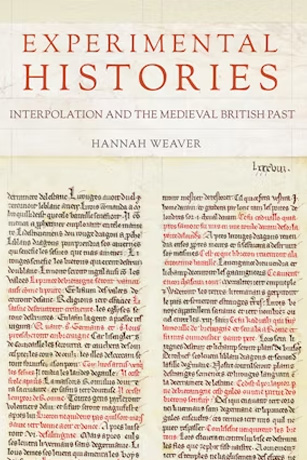
Interpolation and the Medieval British Past •
Hannah Weaver •
Cornell University Press
CONGRATULATIONS
Suzanne Conklin Akbari (IAS / CMS) received a SSHRC Insight Grant as a collaborator on the project ”Legacies of Colonial Violence: Munsee Land and History in Southwestern Ontario.”
Agnès Boutreux(PhD Student) was awarded the CMS Publication Prize for her article, “Antoine Tavera, découvreur de Daudé de Prades: profil perdu d’un philologue” in Occitània, centres e periferias, centri e periferie, Atti del XIII Convegno dell’AIEO (Cuneo, 12-17 luglio 2021).
Deanna Brook’s successfully defended her dissertation, “Wulfstan’s “Commonplace Book”: Manuscript Production, Translation, and Intellectual Culture in Eleventh-Century England.”
Oleg Bychkov (PhD, 1999) was awarded a National Endowment for the Humanities grant to edit and translate an important work of Franciscan scholar John Duns Scotus.
Lisa Cruickshank won the CMS Publication Prize for her article “May she endure as worthy and chosen’: Queenship and Gender in the Medieval English Coronation Order” in Viator 54:1.
Andrew Dunning (PhD, 2016) was elected to a Hugh Price Fellowship in the Humanities at Jesus College, Oxford.
Konrad Eisenbichler (Italian Studies / CRRS / CMS) was elected a Fellow of the Royal Historical Society of the United Kingdom, was presented with the Sixteenth Century Society’s 2024 Anne Lake Prescott Prize, and was honoured with an award from the Movimento Associativo Italiani all’Estero.
Abigail Firey (PhD, 1995) was honoured by her home institution, University of Kentucky as Lewis Honors College inaugural Faculty Fellow.
Kara Gaston (English / CMS) received a SSHRC Insight Grant for “Word and World in the Later Middle Ages: The Astronomy of Commentaries on the Classics.”
Laura Ingallinella (Italian Studies / CMS) was awarded a National Endowment for the Humanities grant and was a the winner of the 2024 ISSNAF Young Investigator RnB4Culture Award for “The Fraudulent Muse: Gender and forgery in early modern Italy.”
Jack McCart (PhD Candidate) was awarded the 2025-2026 Schallek Fellowship from the Medieval Academy of America.
Alison More (USMC / CMS) was appointed University of St. Andrew’s School of History Bullough Fellow for the Candlemas semester.
Stephen Pelle, with Robert Getz, was awarded a SSHRC Insight Grant for the Dictionary of Old English “Li-Ly” project.
Ann Marie Rasmussen was named Professor Emerita of German at Duke University
Marleen Rozemond (Philosophy / CMS) was appointed to a Chancellor Jackman 6-month Faculty Research Fellowship in the Humanities for 2025-26.
Boaz Schuman (PhD, 2021) was awarded an FWO-funded three-year postdoc at KU Leuven, working on a project dealing with medieval logicians’ views on proof by contradiction.
Markus Stock (German / CMS) received a SSHRC Insight Grant for “Medieval Undergrounds: A Cultural History of Extraction,” and was reappointed as Vice-Dean, College Relations in the Faculty of Arts & Sciences.
Bard Swallow (PhD Candidate) was named a Doctoral Fellow at the Northrop Frye Centre, Victoria College.
Richard C. Taylor (PhD, 1981) was awarded the Aquinas Medal for Excellence in Christian Philosophy by the Étienne Gilson Society.
Christopher Trigg (MA, 2003) was awarded the Nanyang Technological University of Singapore Education Award.
Cameron Wachowich successfully defended his dissertation, “Orosius Insularis: Studies on the Transmission and Reception of Orosius’s Historiae adversus Paganos in Britain and Ireland to c. 1100.”
Postdoctoral Mellon Fellowships at the Pontifical Institute of Mediaeval Studies for early-career medievalists provide the opportunity for research and scholarly exchanges. PIMS Mellon Fellows will participate in research seminars and benefit greatly from the medieval community at the University of Toronto.
The Toronto-Rome Diploma Programme in Manuscript Studies will be held in Italy this summer from June 2 to July 4. The programme provides training in Latin Palaeography, Diplomatics, Codicology, and Textual Editing.
The deadline to apply for these programs is February 1.
IN MEMORIAM
Ronald John Zawilla 1948-2024

Previously a Dominican Friar, University of Toronto Alumnus, Ronald John Zawilla earned a Licentiate in Medieval Studies from the Pontifical Institute of Medieval Studies in 1984, and his PhD at the Centre for Medieval Studies in 1985. His dissertation, The Historiae corporis Christi Attributed to Thomas Aquinas: A Theological Study of their Biblical Sources, contains research that continues to be cited in today’s scholarly works, and his name remains synonymous with the academic work of historical and liturgical study of the feast of Corpus Christi. Notably, in Thomas Op De Coul’s Dealing With Change: The Carthusians and Corpus Christi (Cambridge University Press 2021), Zawilla was referenced no less than eight times.
His scholarly articles explored Franciscan and Dominican spirituality, and have been published in many journals including Spirituality Today, Mediaeval Studies, The Modern Schoolman, and Manuscripta, and his translations have appeared in Theology Digest and New Blackfriars. He contributed several chapters on Dominican devotion and sacrament to both the Dictionary of the Middle Ages (Charles Scribner’s Sons, 1989), and The New Dictionary of Catholic Spirituality (Liturgical Press, 1993), and discussed liturgical vestments in Clothed in glory : vesting the church (Liturgy Training Publications, 1997).
Leaving Toronto, Ronald studied medieval manuscripts at the Institut Catholique de Paris, and became an Associate Professor at the Aquinas Institute of Theology. He continued his teaching career at the Illinois Institute of Art, and his passion for design eventually led him to Genesis Studio at Watra Church Goods in Chicago, serving as a Liturgical Consultant and Designer. Performing liturgical environment studies, he was hired by Christ Our Redeemer Parish in Niceville, Florida in 1998 to establish a concept and direction for the development of a new sanctuary. His name remembered six years later, he was also sought to design the sanctuary’s furnishings.
Ronald John Zawilla will be deeply missed by his former classmates, colleagues, and the medieval community, but remembered fondly through his lasting and meaningful work.
"Ron Zawilla and I were graduate students together at the Pontifical Institute of Mediaeval Studies. At the time, he was a Dominican friar, and was part of what was a magical moment at the Institute, when a truly amazing group of Dominicans were teaching and working amongst us all at the same time: Father Leonard Boyle, Father James Weisheipl, and Father Osmund Lewry. Ron and I sat at their feet together, and it made me want to make the study of their Order’s history and charism my own life’s work. And I include Ron in that; he was such a gentle presence, and taught me so much, especially about Thomas Aquinas and the office of Corpus Christi that became the focus of his dissertation research. He never published that dissertation, but I found myself citing it in an article quite recently and thinking of Ron. And thanking him again for his careful scholarship and for his friendship."
- M. Michèle Mulchahey
Leonard E. Boyle of Manuscript Studies
Pontifical Institute of Mediaeval Studies



